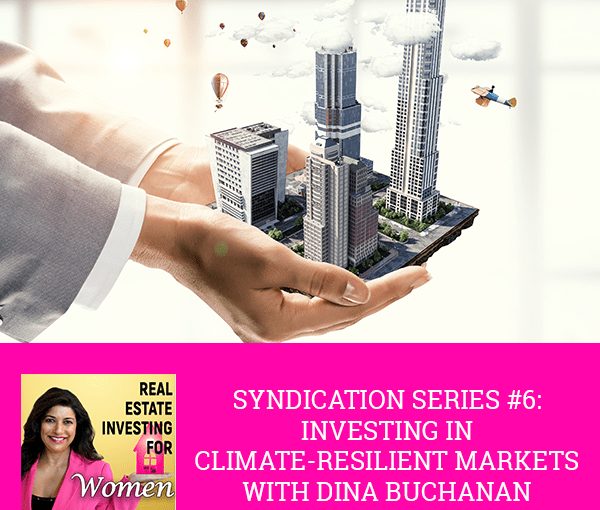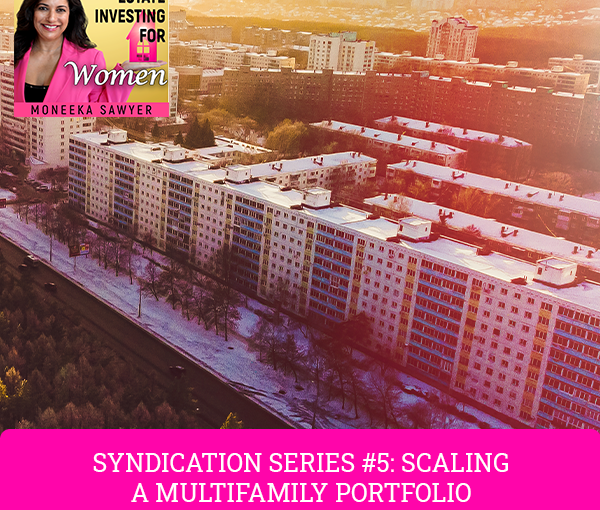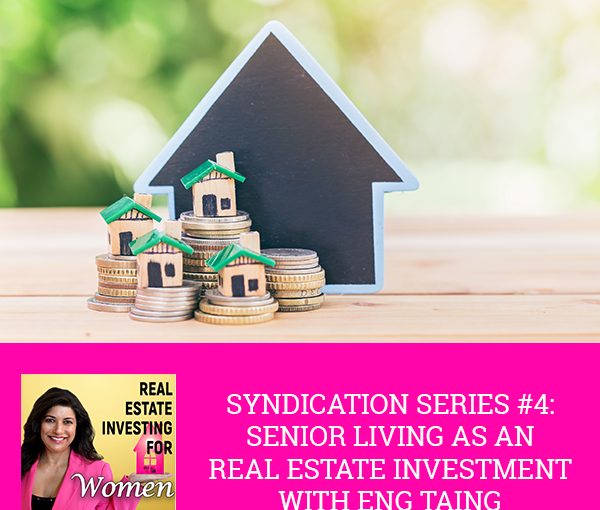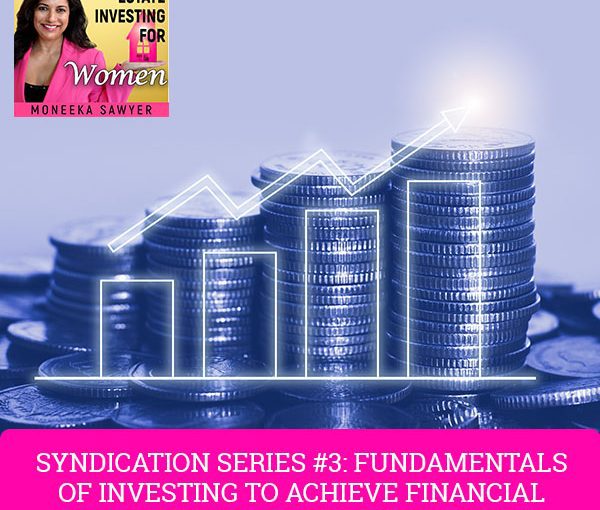Syndication Series #6: Investing In Climate-Resilient Markets With Dina Buchanan
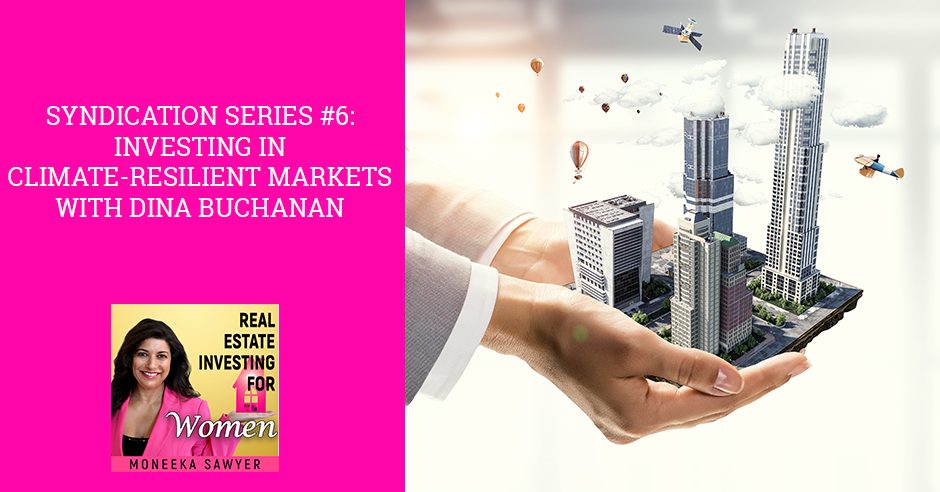
There are more reasons to invest in climate-resilient markets than just the climate piece. Here to tell you all about them is Dina Buchanan. Dina is the Director of Investor Relations and Business Development at PCRP Group. In this episode, she joins Moneeka Sawyer to share the value in investing in climate-resilient markets not only for the environment but also for your wallet. Dina highlights the strategies to incorporate energy efficiency in your multifamily investments to create value and do good for the community. Stay tuned!
—
Watch the episode here
Listen to the podcast here
Syndication Series #6: Investing In Climate-Resilient Markets With Dina Buchanan
Real Estate Investing For Women
Welcome to the Syndication Series, where you’re going to learn all about what syndication is and how you can utilize it to build cashflow and grow your wealth. It’s an exciting strategy and I’m looking forward to sharing all of our guests with you. Let’s get to the show.
—
I am so excited to welcome to the show Dina Buchanan. She is the Director of Investor Relations at PCRP Group, a firm that provides direct access to tax advantage and passive income commercial real estate opportunities. Dina has been investing in residential and commercial properties in the United States and internationally for years and has been responsible for overseeing approximately $200 million of assets under management. Dina, how are you? Welcome to the show.
It’s so great to be here. Thanks for having me.
I’m so looking forward to this conversation. It’s something we’ve never talked about on this show. I’m super excited. Dina, why don’t you give us first a high-level version of your story? How did you get into real estate?
I’m probably like a lot of other people out there. My husband and I wanted to start a family. We had these high-level corporate jobs. We went to school, got our education like we were told to do. We realized we didn’t own our time. We wanted to have more time. We love to travel. We want to start a family. We searched out opportunities for businesses and it all kept coming back to real estate. I don’t know why. Everything we looked at, from franchises to even in real estate, we were like, “This is what we’re resonating with.” We took a class and we got some education. Everyone should do it.
It’s a great idea. It’s like we went, “Poof.” Originally, we were thinking it’ll be me that stays home with the kids and my husband would keep his job but he ended up leaving his job first. I went on maternity leave with our first child and never went back. That was awesome. We did fourteen residential transactions in our first year. That was enough to replace his income.
We started to get involved with passive and did our first apartment community three years later. That’s when it started making like, “This is intoxicating. This is getting good with passive income.” That led to a series of other deals in syndication opportunities. I’m so excited to always talk about real estate and get everyone excited and knowledgeable about it because it’s changed our family’s financial DNA rather than having to go work for money, having money work for us.
Your first fourteen deals in the first year, what were they?
They were residential single-family homes. It was interesting, I thought that you had to start with residential. It’s what everybody did. We’re like, “We got to do it.” We did that first apartment building. I was like, “I wish we did fourteen of those in the first year.” Not that we were doing poorly, we did well. It was such a game-changer when you look at cashflow diversification over 27 units, which was our first one versus 27 single-family homes. When you look at the cash-on-cash return per door, it’s not that much of a difference. It’s a lot less to get in than 27 single-family homes if that makes sense.
Did you flip those homes? Did you buy and hold? What were you doing with those fourteen homes?
The power of syndication allows an investor to have their money duplicate itself faster and not have to do any of the work.
We did a strategy called flip, flip, hold. Our coach was very helpful in helping us reallocate those funds into passive income properties because he said it’s great to have all this capital at some point. He said something to me that was interesting. I didn’t get it then but I do now. You always want your money working and working harder for you.
Holding on to a whole bunch of capital, which probably would have been more of what we thought we were supposed to do back then would have been the thing. Having that opportunity to learn how we can take this money and buy three more properties, spread it out, leverage, use private money and use bank funding. Get a cashflow on these properties and then buy some more, flip those, move that money in and increase our passive income so that we could retire from a job.
You were actively involved in a couple of flips and then you would hold a couple of flips. Talk to me a little bit about climate-resilient markets, the thing that you talked about that nobody else has. Could you first describe what that is? Define it for us.
One of the things my business partner and I are very passionate about is reducing the carbon footprint in our world. People can agree or disagree that it’s necessary and it’s not what we’re here talking about. The big piece that is very interesting to everyone is how it impacts the bottom line for us as investors on all of our projects across the board. Regardless of where we are on the great debate of our generation, the numbers don’t lie when you do the math.
The opportunity in climate-resilient markets tends to be better because we don’t have issues with funding or refinancing. Insurance can play a part and things like that. If we’re going into a market and renovating that building and putting in some energy-efficient appliances or products and using those types of things, it can be great tax advantage for the project. A climate-resilient market would simply be one that doesn’t experience the extreme weather patterns that other markets may face, coastal markets, hurricanes, extreme heat, tornadoes or deep freezes.
They don’t experience those things?
Not to the same level. For example, I live in Florida. A lot of people associate Florida with hurricanes. It’s true. They happen. I live in Central Florida so there could be a hurricane East Coast or West Coast and maybe we’ll get rain and wind. I’m in the middle of Florida and Florida is not that wide so I could be at a beach on either side within an hour. Being 60 to 80 miles inland is a huge difference in what the damage will be or won’t be. It’s fascinating when you think about it. Same product, same state, it could be completely different.
What is the pricing like? You’re in Central Florida, I thought it would be a different product. It’s not a beach product. It’s a different product and location. It’s got to have different pricing, appreciation and demand. Does it have all of those things? What are you finding?
It’s interesting when we talk about Florida because it feels like the entire state is in demand. The beach, waterfront property, people love living on the beach. We had some Airbnb units on one of the beaches. They could be powerful generators of cash and good investments. However because I live in Central Florida, we live where there is a lot of international tourism. We’ve got Disney, Universal, Legoland and Sea World.
The short-term rental business in Central Florida has exploded because there is equally a demand because there are many people who want to come in. Hotels are booked up as well. It’s interesting people want to buy second homes here. A lot of them want to buy them and maybe live in them for four months out of the year and then rent the rest of the time. That used to be reserved for the beach properties but we’re seeing it inland too. It’s interesting.

Climate Resilient Markets: A climate-resilient market would simply be one that doesn’t experience the extreme weather patterns that other markets may face.
You’re investing in Central Florida. Are there other areas that have similar types of demographics and demand?
Every market is different. The market is in demand. We’re doing multifamily properties. Those are always, in my opinion, and what I’ve experienced over the last couple of decades, always in demand. They keep getting more in demand as we see housing shrinking as far as availability. There is less. We will see that demand. We do have properties in San Antonio and Dallas. I’m talking apartment communities. We have seen a huge demand there.
Our occupancy in one of our properties in San Antonio, for example, hasn’t been below 97% in 1.5 years and it keeps getting higher. I see it in other markets as well. Whether you’ll see the same price point in other markets, that might be different as far as beachfront being inland. The dynamic with Florida’s a little different because of the tourism that we have in the center of the state. If you went to any of the beaches in Florida, you’d see the same.
In one of the questions you sent me, you said that climate-resilient markets tend to give you higher returns. Can you break that down for us a little bit?
Let’s break it down into pieces. Multifamily, we do multifamily mainly. Anytime we can have cash flowing door under the same roof, there is an opportunity there. Whether it’s a climate-resilient market or not, that’s number one. It’s the same principle as if we were going into a market that wasn’t climate-resilient and we’re going to go in and buy a Class B property. We’re going to buy that property below market value so it would be a property that was 10 to 20 years old that needed some upgrades. Where this gets powerful is the ability to do the upgrades because we already are going to pick a property that’s going to be in a high-demand market even though it’s an older property.
We’ve got the opportunity there like any other market to add value. Where the environmental and social governance piece comes in is we will put in our sponsors that we align with. If we do energy-efficient appliances, materials, paints and flooring that are more environmentally friendly, tenants love that because it reduces their overall monthly cost. Your demand and occupancy are going to be higher. We’re looking at the big picture and setting ourselves up for success that way.
How does it reduce their cost monthly? I’m a contractor. I run a construction company also. My experience is that if we do all the green types of things, it’s significantly more expensive to do the improvements that way.
The tax benefits for some operators that are doing that depending on how they set up can significantly offset the cost of those items. How it affects the tenants is their energy bills will be lower. The other thing to add to that is that you’re building your cost segregation where you can depreciate 39.5 years on a commercial and 27.5 years on a residential. If we’ve got a tenant that stays longer, overall, that’s going to reduce the expense for the owners of that building in that syndication as well.
In general, another area that makes sense is when we’re putting a multifamily building in an environment and we’ve got maybe some mass transportation, situations where it’s helpful for them, we can promote more green areas, we’re doing good for the community as well. It can help on a number of levels, not just dollars and cents wise. The bigger piece is getting these properties, especially how the investors will get out from a syndication standpoint. If we are in a climate-resilient market, we don’t risk having insurance issues and lenders don’t want to finance or refinance because there are some climate risks.
Ladies, we’re going to be talking about that deeper and EXTRA about some of the risks of being in a climate-resilient market avoids. Some of the big benefits of being in a climate-resistant area and also how to find those kinds of properties and those areas. That’s what we’re going to do our deep dive in EXTRA. Thank you for giving us a little bit of that and I’m excited to talk more about that. Could you talk to us more about ESG? What does that mean and how does it provide a benefit for investors?
People that are not factoring in climate risk into their evaluations could be setting themselves and their investors up in a syndication that could be very risky.
Environmental Social Governance is what ESG stands for. It’s something that we’re seeing larger companies pay attention to. People who are not factoring in climate risk into their evaluations could be setting themselves and their investors up in a very risky syndication. As things change and progress with the climate and it is happening, we have a huge problem with it. The worst the climate gets, the more risk effects of flooding. Anytime there is an insurance claim on a property due to weather, that’s going to affect that insurance business.
That’s a little bit more of our deeper dive but to give a bigger picture of why we’ve chosen this, we see larger companies paying attention to this and we know if they’re paying attention to it, there’s something there. There’s got to be a reason why they’re looking at underwriting and, “What’s going on?” The other reason is we as business owners and investors, not only does it help us do a better job for our investors but it’s also doing better for the environment and the planet.
Multifamily housing does reduce the carbon footprint. It’s socially responsible as well. Having a diverse team like our business is a woman-owned business. We’ve got a lot of diversity on our team as male to female. Having a diverse group that understands the dynamics of affordable housing and what we want to provide for the people that are going to be living there and how that’s all governed and plays out. Our motto is, doing good while doing well.
I love that because being socially conscious is such an important thing to my heart.
Mine too. That’s why we connect.
Dina, many people have come on my show and talked quickly about what an accredited investor is. Most of the time they don’t define what that is. I’m so delighted that you can finally define that for my ladies. I want to talk about that a little bit deeper. We’re talking about syndications. They have investments for accredited and non-accredited investors. The SEC has certain rules for the operator based on what investor they will take. The SEC understand that this is not the syndicators doing this.
The SEC decides if you’re going to take accredited or non-accredited investors, what you need to do and provide. For instance, if you’re saying that you’re an accredited investor, you need to show tax returns or assets. You need to be willing to show that information, not because the syndicator is being nosy. If they don’t have that paperwork, they can get shut down and sent to jail by the SEC. It’s a big deal.
We’ll take a letter from their CPA confirming it. There is also a tool that we have in our portal that does help them provide the proof of accreditation and we’ll look at that for them.
We invested in another syndication and they wanted us to use that portal. There was a cost involved. It’s a small little cost, ladies but my husband was like, “I don’t want to do that.” There are lots of different ways that we can do. You can provide this. This is one of those pieces that hits people. They get a little blindsided by, “Why am I having to send this information?” I’m so glad that we had this conversation. We had this series about syndication and I’ve gotten questions like, “The syndicators are asking for my personal information.”
The syndicators are not asking for their personal use. They’re asking for it because it’s required of them from the SEC. Don’t be offended because they don’t want to go to jail and help you make money. They would rather you going to end up with any legal problems. It’s a requirement by the SEC. I’m glad that we had that conversation. Let’s again define what accredited is.

Climate Resilient Markets: Multifamily properties keep getting more and more in demand as we see housing shrinking as far as availability.
An accredited investor is someone who has $1 million of income-producing assets minus their personal residence and/or $200,000 a year income with two years tax returns as proof if they’re single and $300,000 if they’re married, again, tax returns that are proof or Series 7 license as well.
I didn’t know about that. That’s interesting. There has to be the expectation of continued income. It can’t be that I’ve got two last tax returns that show this income and I retired this year, which is great if you retired this year. It has to show the expectation of future income. Those are some of the things. Ladies, don’t get offended when someone starts asking you about your situation. They’re not being nosy.
It’s the way we can all do business and continue to do business for sure. One of the things that my husband and I discovered is we had money and we said, “What do we want to do with this money?” One of the things we’ve learned, and this is a cool way to look at it is the rule of 72. The rule of 72 is a barometer of what we use to figure out how long it will take that capital we have to double based on the current interest rate it’s making or the projected interest rate in the investment we’re looking at. A good way to look at this is if you take a traditional 401(k) and somebody had $100,000 in that 401(k) and it was earning 6% a year.
How long would it take for that $100,000 to double? We would divide 6% by 72 and that would be 12 years. Depending on the time in your life you’re looking at that. We’re talking about age. If I was sitting on the side of 35 or 40, all of a sudden it looks different than it did at 20. Retirement looks a lot different. If the money isn’t working fast enough, that means the person, individual, myself or any of you, we have to continue to work. We’re looking to get the money to duplicate itself quicker. The big reason for that is we want our buying power and the money is inflation. We could have a longer conversation with this but the rate of inflation and it keeps going up.
It’s not about prices necessarily going up. Even though it seems like it is, it’s the value of money going down. It’s losing buying power and it’s everybody’s money. There are smart people and very smart people who want to duplicate their money as fast as they can to keep their buying power in check so they can continue and live the lifestyle they want or better their lifestyle if they want. Whatever they want to do if they want to travel more. When we’re looking at an investment of syndication, for example, one of the opportunities that PCRP is considering has an internal rate of return projected of 18% or 20%.
If you divide that by six, now you’re looking at like 3.5 years for that money to double. Significantly different. That means the investor that invested in an opportunity like that can keep their buying power and increase it, which is the real goal to increase the buying power. They can either retire sooner or retire in a lifestyle by design, whatever they choose. This is the power of syndication because it allows investors to duplicate their money faster and not have to do any of the work.
When you invest in syndication, you get the cashflow, benefit of the appreciation and depreciation on your tax returns every year that you’re invested and you are doing no of the legwork. None of it. Someone else is doing all the legwork. You get your K-1. That’s what you get a year. You get to write all that stuff off. I’ve been an investor for a couple of years. At the end of the year, I’ve been making 10% interest on my money invested every year like clockwork. I get my K-1, we’ve got our depreciation. I pay no taxes on that 10%. We will pay at the end when you sell then you have all of that other stuff that has to be wrapped up.
When we’re doing the 10% each year or whatever that particular syndicator will give you sometimes it’s 7% or 10%. There’s different risks, ladies. I know I’m quoting 10%, they’re high-risk projects. If you want to go with safer projects, you’re going to be getting paid probably closer to 7% or 8% usually. I hope that I’m not making too many quotes for you. That’s the way that it works. A syndicator will give you a quote.
IRR is the Internal Rate of Return. What’s interesting about that is you don’t know what that is until the project closes.
Define that. What does that mean?
Multi-family housing reduces the carbon footprint, so it’s socially responsible as well.
Internal rate of return, that’s how the project is projected to perform. It’s a projection and it should be right in line with that. When you add in the tax, depreciation, cost segregation, all of those things that can get written in there, the Internal rate of return should be very close to, if not above, what’s projected for sponsors and syndicators that understand this process.
What I love about the projects that we look at is we have a line with sponsors that can produce that return. We have the climate-resilient piece, which is a little extra layer of protection. They’re not as necessarily high risk as maybe somebody else’s project could be if it’s not one of those markets. It offers a little bit extra security there too and a better rate so we love that.
I know that people have thrown away around that term IRR and it’s not something that we’re used to hearing. What it does is it takes the interest rate that you’re earning each year on your money. Sometimes they’ll refinance a project and then they’ll give you a portion of the cash out piece. That’s included in the IRR. When they sell the amount that you get paid, all of that is also so that’s your profit, that’s all added in. That’s what your IRR is. It’s all of those pieces together. The other thing that you mentioned that I want to highlight for ladies is on this show we talked a lot about retiring early and blissful. We want to help people to have a blissful retirement.
The journey to get there should also be blissful. I’m all about bliss, all through your entire life. For me, I’m on that edge where I’m looking at retiring. There is a lot of stuff going on in my mind that a lot of people don’t think about. Since you brought it up, I’d like to mention, we do have inflation. Whether it’s talked about or not, the prices of goods seem to keep going up. It’s not that prices are going up, although sometimes they are but the buying power is what’s going down. Our money does not have the same value than it had 20 or 10 years ago. I call this a grocery store inflation.
You go to the grocery store and see how much you could buy now with $20 as opposed to what you could buy 10 years with $20. I know this is a little off, ladies. I’m not accurate in all of the things that I’m saying. I’m giving you a high level of how to look at this. When you’re thinking about retirement, a lot of people say, “If I have $2 million and I’m getting 10% that will give me $200,000 a year, that’s what I’m living on right now. That will be able to maintain my lifestyle.” If you don’t continue to grow that $2 million, you’re not going to be able to keep up with inflation and the loss of value of the dollar.
When you’re calculating that retirement number, you need to calculate that you’re going to continue to save 10% a year. Ten percent goes to you. You always pay yourself first before you pay anybody else. Even when you’re calculating that number, let’s say now it’s $200,000 a day, make sure that you can calculate that you’re going to save at least, maybe even more, $20,000 a year and it’s going to go up. Would you say that’s true or would you give me even more numbers or would you say even more?
I would say more. It’s not about what you’re saving, it’s about what your money’s making. If you take that 10%, that could be good. The problem with saving it is we still have this depreciation going on of the dollar. We did a big number of stimulus package and that money is important to everybody to realize that it’s not money that was set aside for these things, it’s money that was printed. They continued printing where they’re at a place where they’re going to continue to print, that’s a whole other subject but the reality is they’re still printing.
The more they print, the same amount of money it would take to retire. If your retirement date was in ten years from now, I believe what you’re saying is, would this be enough? If it’s saved, my answer is no. The money is not going to go as far. However, if it’s invested and it starts to duplicate itself, it could be. It’s probably going to be individual, depending on what type of lifestyle that you’re planning for. Is it the same? Is it better? Does it not need to be as much as you’re making right now. Everything, cost-wise, it’s going to take more dollars to do the same things tomorrow as it does today.
Thank you for that clarity. I always say save because for me, it’s synonymous and I realize that it’s not for others. For me, save means invest. It’s synonymous for me. Ladies, when you hear me say that, save 10%. What I’m saying is invest 10%. I’m always like that. I understand that I misspeak because it’s not precise. You do want to be investing and continuing to have your money grow. There’s a couple of reasons why I love what Dina was saying. The first reason is the value of the money goes down. We have to have that increase to make up for inflation. The whole thing of inflation is a completely different story.
The other thing is, understand that you don’t have a lot of free time when you’re working. When you’re retired, you might want to travel more to see your grandkids and eat out more. You’re tired of cooking. You might want to get someone to clean the house. There are a lot of expenses that we don’t have as working people that we will possibly have when we’re retired. I’ve seen this with all three sets of our parents that they spend a lot more now that they’re retired than they did because travel is expensive. They’re still paying their mortgage and all these other things. Understand that that increase not only should account for inflation but you want to know that your lifestyle can go up.

Climate Resilient Markets: There are smart people and there are very smart people. Very smart people want to duplicate their money as fast as they can to keep their buying power in check so they can continue to live the lifestyle they want or better their lifestyle.
You’ve worked all these years that you can live the lifestyle that you want in retirement and that you’re not restricted by, “I only calculated as much. It was not the right calculation.” As we talk about syndication as a possibility for helping you retire, keep it in mind that it is also after retirement as a strategy to continue to grow your income, portfolio and assets so that you don’t get stuck with this ceiling of what you can afford after you retire. I feel like syndication projects are a big part of my plan as I’m looking at retiring. I wanted to interject that.
Looking at 2020 with COVID, I’ve taught many real estate investing classes and one of the things I was talking to my class about once was everybody was in the same storm but not everybody was in the same vessel in that storm. If you think about it from that perspective, if your worst problem during that time when you were sequestered, which was our family, we’re bored, that’s a good problem. There are people that were not in that same boat. They were in a situation where they couldn’t leave to go make money. They didn’t have any passive income but ours looked a lot different from maybe somebody else’s because we did have passive income.
I’m certainly not saying that to impress anybody but to impress upon you with passive investing and syndications. Those types of opportunities that we can have allow us to have that freedom. Who could have predicted a pandemic? There are going to be things that happen in life that none of us can predict. 2008 wasn’t exactly predicted per se. During those times, not just retirement but important to say, even now, starting to build that passive income, think about how much less you have to trade time for money. It’s almost like an insurance policy of cashflow because it’s going to come in. You don’t have to do anything for it.
I always say, if cash is king, cashflow is queen and the queen is always right.
I used to say cash isn’t king, cashflow is king. That’s so funny but I like queen better.
I can’t believe that this conversation was so good. Ladies, the conversation is going to continue and we’re going to go into EXTRA and we’re going to be talking more about the questions to ask when you’re looking for a climate-resilient project? How to evaluate those projects? How to find those projects? What are the trends and how to find those trends? We’re going to be talking all about that in EXTRA. Before we move into our three rapid-fire questions, Dina, could you tell us how people can reach you? I know you’ve got some gifts for us.
For anyone who wants to learn more about syndication, passive investing, climate resilient markets, how we pick them and why we picked them, go to our website, PCRPGroup.com. Sign up and you can download our free eBook. We are going to have an educational webinar series that I’m going to be leading with my business partner.
We’re going to do shorter snippets of 20 to 30 minutes because we know everybody’s busy and we want to get the facts out. When you’re spending your valuable, precious time learning, you want it to be quick and to the point so that you can get the good information in and go apply it. That’s the goal. Anyone that’s on this episode, please go ahead and sign up. It’s complimentary for you and learn.
Where do they go for the website?
PCRPGroup.com. If you want to reach out to me, it’s [email protected]. You can email me and set up a time to schedule a phone call about your investment goals and passive investing. I’m happy to help out any way I can.
It’s not about what you’re saving, it’s about what your money’s making. The problem with just saving it is we still have this depreciation going on of the dollar.
Dina, are you ready for our three Rapid-fire questions?
I’m ready.
Give us one super tip on how to get started in real estate investing.
The first thing I would do is educate myself. It could be a book or a course. I’m a big fan of classes, seminars, 1, 2 hours, 3 days even. There is a lot of opportunity and knowledge that gets dropped in an environment of people of like-mind. I’m a big proponent of educating yourself. You got to know what you’re going to get into.
What is a strategy on being successful as a real estate investor?
It sounds so simple but it’s have a system. If you’re looking at properties, have a system or checklist. A checklist is a great, simple but very powerful tool to make sure you dot your Is and cross your Ts and have somebody that’s already doing the business maybe look at that checklist. Maybe they’ll add some items that you didn’t have on there. It’s not a how-to renovate a house or a building but it gives you key things that get forgotten or could be harmful in a deal but it also gives you key things to remember to do.
I believe that systems are the key to bliss, simply because they allow you to unload all those things in your brain. Honestly, I have invested in syndications but I might do one a year. Each year when I go back to evaluate syndication, there is a whole process. I don’t want to have to reinvent the wheel every single year. That’s stressful. There is a way that we deal with that. I take notes and then I can go back and look at my notes and read my notes, “Those are the things that I thought about. This is what was important. This is what I’ve learned I add to my notes.”
Each year, it’s a little bit easier. Doctor Sam talked to us about a tool on how to evaluate syndication projects. We could add that in there. We get new tools. We learn more stuff. We find out what’s more important to us, what worked and didn’t work. Creating those systems helps us to feel less stressed and more capable.
SYSTEMS. Save Your Self Time Energy Money Stress.
I’m going to use that one, Dina. Thank you. Tell us one daily practice that you do that contributes to your success.
It’s going to take more dollars to do the same things tomorrow as it does today.
Every morning when I wake up, I’m a big proponent of gratitude. I have a quick moment of gratitude for everything that I have and I’m about to create. In my day, after I have that little meditation moment or a mindful moment, I pick out one thing that I want to focus on for that day and feel what it feels like when I’ve accomplished it. I take that energy and use it and ride that momentum so that at any point in the day if things happen, I got to pick up the kids, this practice was canceled.
This throws off this timing, go back to that mindfulness and click into that feeling because we all have these things no matter who we are. This is life. Anything that can take away from our bliss, we want to remove that because it takes us off track. It takes us down a tangent that we don’t want to be on. I’m very focused on mindfulness every day about what we want to accomplish and what it feels like. I can tap into that feeling and shift it and go about my day. That’s something I do every day.
This show has been amazing. We’ve talked about so much good stuff. Thank you, Dina. Ladies, thank you for joining Dina and I for this portion of the show.
It’s my honor to be with all of you.
We have more, ladies. We’re going to be talking about finding and evaluating climate-resilient properties and one of the big benefits of that. We’re going to do a deeper dive on that. If you’re in EXTRA, if you’re subscribed already, please stay tuned. It’s coming next. If you’re not subscribed but would like to be, go to RealEstateInvestingForWomenEXTRA.com. You get the first seven days for free so check it out.
If you’re leaving Dina and me now, thank you so much for joining us for this great conversation. I loved having you here with us and I look forward to seeing you next time. We will see you then. Until then, remember, goals without action are just dreams. Get out there. Take action and create the life your heart deeply desires.
Important Links
About Dina Buchanan
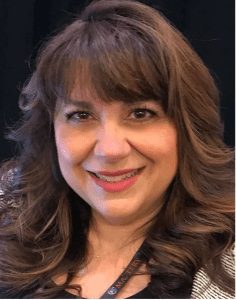
Love the show? Subscribe, rate, review, and share!
______________________________________
To listen to the EXTRA portion of this show go to RealEstateInvestingForWomenExtra.com
To see this program in video:
Search on Roku for Real Estate Investing 4 Women or go to this link: https://blissfulinvestor.com/biroku
On YouTube go to Real Estate Investing for Women
Moneeka Sawyer is often described as one of the most blissful people you will ever meet. She has been investing in Real Estate for over 20 years, so has been through all the different cycles of the market. Still, she has turned $10,000 into over $5,000,000, working only 5-10 hours per MONTH with very little stress.
While building her multi-million dollar business, she has traveled to over 55 countries, dances every single day, supports causes that are important to her, and spends lots of time with her husband of over 20 years.
She is the international best-selling author of the multiple award-winning books “Choose Bliss: The Power and Practice of Joy and Contentment” and “Real Estate Investing for Women: Expert Conversations to Increase Wealth and Happiness the Blissful Way.”
Moneeka has been featured on stages including Carnegie Hall and Nasdaq, radio, podcasts such as Achieve Your Goals with Hal Elrod, and TV stations including ABC, CBS, FOX, and the CW, impacting over 150 million people.
Syndication Series #5: Scaling A Multifamily Portfolio With Liz Faircloth
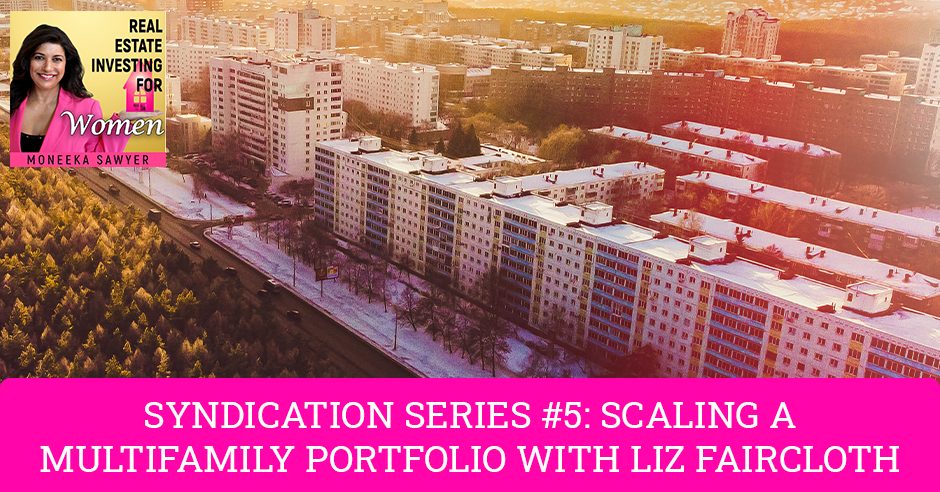
Multifamily is the ultimate goal of many real estate investors in America. Achieving the dream is possible, but how about scaling? That’s where Moneeka will help as she discusses scaling multifamily investments with the cofounder of the DeRosa Group and the Real Estate InvestHER community, Liz Faircloth. Liz talks about getting into real estate, how she and her husband pivoted into multifamily, and what you need to know about out of state investing. Learn more from Liz and Moneeka about the multifamily market by tuning in.
—
Watch the episode here
Listen to the podcast here
Syndication Series #5: Scaling A Multifamily Portfolio With Liz Faircloth
Real Estate Investing for Women
In this episode, I am so excited to welcome to the show, Liz Faircloth. She Cofounded the DeRosa Group in 2005 with her husband, Matt. The DeRosa Group, based in Trenton, New Jersey, is an owner of commercial and residential property with a mission to transform lives through real estate. DeRosa has vast experience in bringing properties to their highest and best value, which includes repositioning single-family homes, multifamily, apartment buildings, mixed-use, retail and office space.
The company controls close to 1,000 units of residential and commercial assets throughout the East Coast. Liz is the Cofounder of The Real Estate InvestHER community, a platform to empower women to live a financially free and balanced life through over 25 Meetups across the US and Canada, an online community and membership that offers accountability and mentorship for women to take their businesses to the next level.
She is the co-host of The Real Estate InvestHER Show, which I will be on too. They published their first book, The Only Woman in the Room: Knowledge and Inspiration From 20 Women Real Estate Investors. Liz has been interviewed for many articles and top-rated podcasts, including mine, including being a two-time guest on the top-rated BiggerPockets Podcast and the Best Ever Show. On the personal side, Liz is an avid runner, has completed several triathlons and marathons, has two adorable children and is a New York Mets fan. Liz, welcome to the show.
Thank you so much for having me.
It’s nice to see you again. You and Andresa do so much cool stuff with the investor community. I love what you’re doing together, but I haven’t gotten to chat with you about what you’re doing. Why don’t you give us a high-level version of your story of how you got interested in real estate and what your path has been?
It wasn’t a linear path. My husband and I at the time had started dating. Before we started dating, I was in graduate school for Social Work. I got my Master’s in Social Work, wanted to open my practice and help people. That’s always been my passion. I grew up in a great family but middle-class family. My dad was a school teacher. I was never introduced to entrepreneurs or investors. That wasn’t in my sphere of any context growing up. Hard work ethic was there, but certainly the business piece of it, I was not familiar with or didn’t have a lot of exposure.
Until I met my brother-in-law, who was an entrepreneur, started a business and handed me Rich Dad Poor Dad. I’m 23 at the time. He’s like, “You got to read this.” I liked personal growth books. I started in college reading different books and always enjoyed them. I liked learning and growing. I’m a dork in college. I’m reading Awaken the Giant Within and everyone’s like, “What are you reading?” I’m like, “I don’t like fiction.” I still don’t like fiction. I have to learn something from it.
Long story short, I read that. My eyes were open to this idea of passive income. I honestly never heard of that before like, “I can have money working for me, not me working for money.” It was a whole new opened my eye concept, which I know a lot of people have said, but what got us involved, I then started dating my now-husband. We lived about two hours from each other. Every weekend we’d go to all the REIA meetings and start learning.
Make sure you’re mitigating risk for yourselves, but most importantly, your investors.
We’re in our twenties and didn’t know anything. We didn’t have any money to invest, but we said, “Let’s just give this a go.” We start taking courses. They told you to like the door knock. This was before Facebook Marketplace. It was literally opening the newspaper, go to the foreign ads and calling tired landlords. That was the million-dollar tip we got at one of the events. That’s what we did.
Every weekend, literally, we are knocking on doors, right outside of Philadelphia, where my husband lived when I visited him. One day, we got someone to say, “That’s interesting. Let me think about that.” We called them back and struck up a deal. A year into us taking courses, door knocking, cold calling and bootstrap whatever we could do, we struck up a deal and bought our first property. It was a duplex for $150,000. We learned everything on that property. We’d go with people.
When you buy a property, the tenants that are there may not be your tenants ongoing because of a new sheriff’s in town. We learned the whole multifamily. It opened our eyes. It was only multis in this neighborhood. It wasn’t like we chose a duplex. It just happened because it was older homes right outside of Philadelphia. There were only duplexes and small multis. Long story short, we got our start there, we moved to New Jersey and started our business. We focused on New Jersey in buying properties there.
We sold that property and did a 1031 into a four-unit and then that started our trajectory in New Jersey. Over many years I’ve been doing this, we had lots of twists and turns. I wished we focused on multi, but we didn’t. We got involved in a lot of different things early on, like people who get distracted as they do and people that are probably a little naive, little young as well, can do. We flipped houses.
We got into tax liens. We bought a commercial building. We bought raw land. Every random thing you could possibly think of, we probably have done it until we doubled down on multifamily. Our business is focused on multifamily. We went from a 2-duplex to a 10-unit. We grew very steadily. We didn’t go from a 2- to a 200-unit. We did, but over time and now we focus on larger multis and we’re starting a fund where we’re investing with other operators and things of that sort.
We’re diversifying a little bit outside of multi but more from a fund perspective. I’m involved in that, not day-to-day but more from like strategic level, helping build our team out and exciting to be able to invest in different sectors of real estate, not just multifamily, but we love multifamily. We have a letter of intent on a property in the Southeast, which is where we focused on.
Tell me a little bit more about this fund. Let’s dive a little deeper into that.
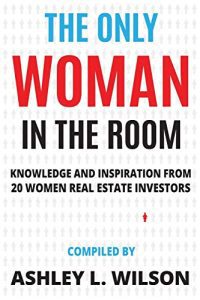
The Only Woman in the Room: Knowledge and Inspiration from 20 Women Real Estate Investors
With regards to the fund, we talk to people all the time. People are like, “This sounds like a great opportunity for a passive investor.” You’re like, “I don’t have a building. I don’t have anything under contract right now.” We refer them. We know a lot of people we like and respect in the business. We have no problem with that. There’s a lot of good syndicators out there.
We wanted to have another flavor of ice cream if you will. The fund will obviously be an ongoing rolling fund and it will give investors what we’re going to invest in and all things that we know and that we’ve vetted. We’re not going to start investing in a business that we have no idea about because that’s a whole other level. It’s like mitigating risk. We want to mitigate your risks. You want to make sure you’re mitigating risk for yourselves, but most importantly, your investors.
Hard money loans will be one. We’re going to start to work with hard money operators that we like and respect, that we know to do good business. We were not the hard money lenders. They are and we’re going to do that. Multifamily will be a piece of it. If we have a project that comes up, we’re going to almost invest in our own projects. That will be a piece of it. Those are the two main pieces.
I want to say, even self-storage, there have been operators. That might be another sector. It will be all related to investing in real estate on some level, but it will be in a way that we are not the sole operators of everything. That’s where, as we evolve, it’s like, you don’t want to do everything yourself. Once you figure that out, you got to focus on that. That’s what that looks like. We’re building out a team and that’s been in the making for some time, but that’s the goal.
I’m so fascinated by that idea because I feel like for me too, there’s something that I do well. I do executive homes in Silicon Valley. I’ve got my entire system. It’s all built out. It runs itself. I don’t worry too much about it. I was telling you before that I’m taking all of May off for my birth month because that’s where my birthday is. We’re traveling to Hawaii and going to a spa in Palm Springs with my sister.
I get to have that lifestyle. It is fantastic. I’m not particularly interested in working significantly more. I do get bored because we have construction projects. We have some other stuff going on so that my entrepreneurial mind doesn’t slow down or get bored. What is happening is I’ve found several different syndicators doing different things. I’ve invested in storage, multifamily and a variety of different things like what you were talking about.
I don’t know how this is going to work for you guys, but every single time I invest, it’s a minimum of $100,000. That’s great for us because we have that money. We’re looking to retire. We’re moving that way, but not everybody who’s reading to this show has access to $100,000 for this and that. They want to be able to diversify without spending that much money. What is that fund look like for you? Is there going to be a minimum investment? Have you worked that out? What does that look like?
One organization we’ve started working with is called Republic. Basically, what they do is, in essence, have a similar type of approach in that people could invest $10,000, even down to $1,000. Don’t quote me on that but I’m not familiar. What’s fascinating though if that for our last syndication, it was a 336-unit apartment building. To your point, our minimum was $50,000 on that project. Not everyone has that, but they want to invest in real estate.
Don’t do everything yourself. Do what you do and do it well.
We found this company and what basically they’re doing is they’re the investor in that project, but they’re the ones going out to the accredited investors because it was the accredited investors to then say, “We are all pooling all this money to gather,” then they are the investor in that project with us. Just so Jane Doe, who’s got a $1,000, they’re all pooled in this together in this company called Republic. Republic is ultimately the investor, if that makes sense. It was really cool because that was the first time we’d ever done that because we thought about it. We have a 336-unit apartment complex. We had close to 80 investors. It’s a lot of people and that’s even at a minimum of $50,000.
You had some people who put a $500,000 and some people put any amount. There’s a lot of money assigned. I’m the cheapest person. I would be putting $1,000 at anything. I’m like, “That’s me. I’m in that kind of money.” I know. I get it. That was interesting. We were pleased to see that. It’s a neat approach. That’s the future, to be honest, because I love that concept and I was intrigued by it. As we do other deals, we’re going to be working with them. I’m not sure the relationship exactly and how that’s going to play out in the fund, but those are the neat example for our last syndication that gave everyone the opportunity and that’s cool.
Are they more of crowd funders, syndicators or do you have any idea of their structure? I’m interested.
I’m not too sure which level they are. I heard about it conceptually and was intrigued, but I know that they’ve been around and they’re not just at the start of the company. There are a lot of different pieces around it to ensure how you do it because some funds are accredited and not accredited. There is an of legal stuff and a lot of money to the SEC attorneys and all that kind of stuff.
I know this is a project we advertised because we only accepted accredited. It’s a project that you can’t solicit. It’s illegal to do that. We have these other projects from friends and family, but I know with this particular project, we advertise because we only accepted accredited. It’s a neat approach, but I’m happy to get more info.
Let’s put our heads together. I’d love to know a little bit more about that because I’m always looking for ways. When I get phone calls from my ladies, when they say, “I’ve only got this much, what can we do to that, for that and with that to benefit them in the biggest way?” Another topic that I’m getting a lot for my ladies is this idea of out-of-state investing, especially here in California. There are a lot of markets where people feel like, “I can’t invest in my backyard.” They’re scared to go out of state. I know that you do a lot of multifamily out of state. Let’s talk a little bit about that, share your perspective and how to look for projects and stuff like that.
For our first seven years, we invested locally. We don’t invest more than 30 minutes away. We had a team. We had a leasing agent. We had our bookkeeper who did all the accounting. We have a tenant relations person and a maintenance person. We had literally four people on our staff besides my husband and me, helping us manage our local properties. We bought a property in Philadelphia, which was an 18-unit and now it was 35 units. It’s like, “We can still do it.” The market shifted. I’m in the Northeast and New Jersey is not the most favorable state on taxes in this country. Even in Philadelphia, the projects that we were looking at were getting outbid.

Scaling Multifamily: We’re not going to start investing in a business that we have no idea, because that’s a whole another level.
It was getting more expensive and we raised money. We work with investors. The returns are important to ensure that we’re going to get into the right project. We’re not just parking millions of dollars from a relative. we’re constantly looking at, “How are we going to get into the right area for our investment goals and our investors?” A broker had brought the same broker. That’s the first thing I’d say as a good tip is to start building relationships with commercial brokers.
Sometimes it’s tough, especially now. You think about a hot market. Everyone’s calling commercial brokers saying, “I invest in multifamily. Do you have anything for me? You and 90 million other people.” You got to like differentiate. Keep that in mind too. We had closed that eighteen-unit with the same broker who called us about a property in Lancaster, Pennsylvania, which is about an hour and a half from where we were living at the time.
He said, “Are you interested?” We like, “One hour and a half, we’re not going to send our leasing agent there. We’re not sending our maintenance person there. We need to look into property management companies.” After betting the deal and that’s a great story in and of itself. The first domino always is a good property management company. You’re going to need that. Some people successfully invest in properties and they self-manage the properties. I’ve heard of it. I know a lot of women who do it successfully.
We knew at a 49-unit, it wasn’t going to be our best strategy. We knew it was going to be important to have a local property management company. Why I say that’s a great person to have on your team? Let’s say your sourcing an area in Alabama or wherever you’re sourcing deals. Before even looking for property, start getting to know the property management companies there because that’s going to follow.
If you cannot find a property management company in a geographical area, that might be a sign for a lot of reasons that something is off. Even with Airbnb, I know that’s very hot vacation rentals and luxury vacation rentals or whatever the people are interested in. If it’s a hot area, there are people managing in that hot area. That’s a great source and a great team member to start to talk to. Number one, they know the area, what streets are good or aren’t good? What areas are up and coming? What areas are just too hot and too expensive because we know that’s the case.
In it exuberant, everywhere is like, “Hold on. What do you want?” On my way to Target, at the end of the day, you’re a real estate investor. You never turn it off. I saw a lot for sale. I’m tangent. I saw a sign that said For Sale and a handwritten phone number. I’m like, “That’s a good sign.” It’s a great area and what county where I live. I’m like, “That’s an interesting area.” I texted the person. I said, “How much is the lot? What’s the size?” All the things you ask. “We’ve done a bit of new construction a time, but we could probably pull it off $250,000.” I’m like, “I don’t even know if you’d get $500,000 for the property. That’s just for the lot.”
People are not even with their prices. Going back to out of state, property management companies are helpful to have on your team. What commercial brokers care about is if you’ve closed deals. They do not want to work with people who are going to get to the finish line and not be able to pull the money together because they want their commission. That’s what they care about.
Beyond everything else you want to talk about with them, they care about if you’ve closed with them or with anyone of them. If you or someone on your core team has closed deals that you’re looking for. If you’re looking at 100-unit, you better have someone that you’re bringing to the table that, “This is the kind of team we have and we’ve done. This is what we’ve closed.”
The idea of the diversity of jobs is even more important than job growth.
That is what they’re thinking right now when you call them. This broker brought us this project and we started to talk to property management companies in the area. What helped and I’d always say this, is if you have somebody in your family or network who lives in the area, it is helpful. You don’t need to have a degree in real estate. They don’t have to have ten years of investing.
If you have some boots on the ground and feet on the street, people that aren’t just property management because our property management company is a vendor, we always like to offer our property management companies potential ownership in the building. Every time we buy a building and we say, “We’re syndicating this. Would you like to own part of it as well?”
It’s not the best sign if they’re like, “No.” Even if they put $25,000 and maybe they think that’s chump change. Most of all the property management companies we’ve worked with have invested in our deals. That’s a good sign. That’s skin in the game, so to speak. I would say the second, start to look at, “Is this an up-and-coming area? Do I know anyone in my network that can help me? Is there a reason to go there? Do I want to go there?” If you’re going to invest in an area that those are questions to ask. If I have to now get on a plane, is that on the way to my aunt or my parents? Is this an area where my kid’s going to college for the next four years?
I don’t know, but make it make sense versus an area that literally you know no one. That can work, but if you can blend a few things in there and it is an up-and-coming area, you’re going to want somebody that’s 10 to 15 minutes from the property, whether it’s a realtor, you got to pay them hourly. If you can’t get there, someone needs to get there because fires happen. Things happen. We have a cousin in this area, Lancaster.
When we’re looking at it, we’re like, “What do you think?” He’s an investor, which was even better, but he was able to be our boots on the ground. He’s part of our general partner. It has been huge. We had a fire there years ago. We want to be to make sure everyone’s okay. We couldn’t be in one hour and a half. The fire is probably going to throw a little more damage than ten minutes.
You said so much there, but a couple of things that I want to highlight is I think that people think that you hear about an amazing market and you should just invest in there. I remember before 2008, in the mid-2000s, everybody was in Henderson, Nevada, outside Las Vegas. I have close friends who are all invested. There was also Florida and Chicago.
Those were some big hubs where they were marketing to investors from out of state, especially California, because California had a bunch of equity and wasn’t working for us. Everybody could get loans by just stating things, so there were these pockets that were trending. People were making money hand over fist.

Scaling Multifamily: You’re going to need a good property management company if you’re investing out of state.
I thought I always play the longer trend. I don’t play the short short-term trends. I will admit I would probably be a lot richer if I got that right more often, but there are so many people that get that wrong. Part of it is they didn’t do some of the things that you talk about. It wasn’t a place that I would ever want to visit. It wasn’t a place on the way to anything Las Vegas, Chicago or Florida. A lot of people didn’t have that mentality of, “Would I want to go there? Would I vacation there? Would I want to live there? Would I want my kids to go to college there? Is there any reason for me to go there?”
Even in Henderson, it’s not like people were like, “I’d like to have something in Henderson because I like to go to Las Vegas.” It was, “I’m investing in Henderson because everybody else is investing in Henderson.” I love how you talk about this, especially in your first few deals. This is hugely important is as you’re getting to know what this is like, the very first time you step out of state, you don’t want it to be in a market that you completely don’t understand that you get a bunch of numbers from someone that’s a vendor. They’re interested in selling these properties.
They’re not going to lie to you, but they’re definitely going to paint a very pretty picture. If you don’t know the market and you don’t know anybody who’s there. We had a friend that moved to Henderson and we went to visit them one time when we went on a trip to Las Vegas. He was like, “There are all these crazy investors coming in here.” All around town, people are like, “This bubble’s going to blow,” because there weren’t as many people in the restaurants anymore and there were things that were closing down.
We’re like, “How is it possible that all his expansion is happening, but the Asheville economy is shrinking?” There’s no way to have known that if we hadn’t had this conversation with our friends that had just moved there. There’s all this hype about Henderson, but they just closed down the local, Whole Foods or whatever market it was. I love what you talk about as we don’t have to have boots on the ground all the time, every time. Eventually, you do develop a skill and get to know markets or you focus on certain markets.
Especially in those first few deals that you’re going out. That is all such good advice. Make sure that it’s someplace you would want to go. It’s like basic, intuitive, common sense stuff that we don’t think about because we get whisked away in the excitement of what’s possible. That basic comments and stuff, I like to go there. Is there anything there that I appreciate? Do I have someone that’s relatively close by maybe within a half-hour that they’re not going to be boots on the ground? Just have the conversation once in a while, see how things are going in that market or whatever.
Thank you so much for that because normally, people are like, “You need to look at the colleges, employers or the average income rate.” You do need to do all those things, but it’s not the end of the story. Especially when you’re starting, it’s not necessarily going to give you the comfort that you need to get out there and do it because nothing happens for you until you take action. If it’s just the numbers and that’s not inspiring you to take action, then nothing is happening for you.
Many people do get caught up. There are so many important numbers as you analyze markets and deals, but even just the idea of what COVID brought is the importance of diversity of jobs. Are there different jobs that people can be employed by? They’re literally all in on the tech, government or in whatever industry. The idea of the diversity of jobs is, to me, even more important than job growth.
They’re both important, but just to know that people can get different jobs. These are positive things. There are many markets that don’t have that. Even high-priced areas don’t have that. We probably invest more in the workforce housing, more up-and-coming areas, not areas that are on any hot market list. If those are the two expensive areas, we’re like, “No. We don’t want to invest in an area that’s on any list.”
Your mistakes are going to just make you propel you forward and you’re going to learn from it and you’re going to grow from it.
It’s much more practical advice. My ladies learn a lot of good advice here from very smart people because sometimes we got to ground it. This is how you make yourself comfortable with that. Ask yourself some real common sense questions because so much of building a real business is common sense. There’s a lot of fancy languaging. There’s a lot of people that say things that sound smart, but in the end, it’s a common-sense business. Thank you so much for grounding that for us. That was helpful.
Ladies, we are going to do EXTRA. Liz and I are going to be talking more about building your team. Finding partners, building teams, when you’re in-state or out of state. She likes to say, “Who’s on the bus,” and then team-building with all those people that are on the bus. I love that picture because you’re all going out on a field trip and you’re all on this bus. Where are you going to go? How are you going to get there? Is it going to be fun? Is it going to be profitable? That to look forward to. Before we move to our three rapid-fire questions, could you tell everybody how they can get in touch with you?
In terms of some of the active multifamily projects or funds or to learn more about some of the day-to-day real estate projects, you can go over to my DeRosaGroup.com. My husband got a lot of teaching as well. We’re both love teaching and helping. You’ll see a lot of YouTube content and things of that sort from him. In terms of women who are interested in getting more support from women and getting connected, check us out, TheRealEstateInvestHer.com. From there, you can learn all about our meetups that are across the country and our Facebook Community, membership and things we got going on with helping women.
Are you ready for three Rapid-fire questions?
Yes, definitely.
What’s one super tip on getting started investing in real estate?
Don’t get distracted. Focus on a niche and go all-in on one thing.
What’s one strategy to be successful as a real estate investor?

Scaling Multifamily: Everyone gets stopped after they lose money and something bad happens, but don’t give up.
Don’t give up. I hope you don’t lose money, but you may lose money, like many of us. You’re going to see it potentially. In many years, I can tell you a lot of interesting stories. It had money like the mini Bernie Madoff situation where literally hundreds of thousands of dollars were stolen from us. We don’t give up. That makes anyone that’s successful in any line of business or anything in life, don’t give up. Know that your mistakes are going to make you propel you forward. You’re going to learn and grow from it. If you don’t have that attitude, then everyone gets stopped after they lose money and something bad happens. Don’t give up. That’s the key.
What would you say is one daily practice that you do that contributes to your personal success?
It’s something I’ve always done, then go back and forth and don’t do it consistently. I do daily prayer. I read a little spiritual and think about it. I’ve been doing like ten-minute meditation. I’d like to increase that eventually. For me, it’s been super helpful. I focus on whatever I learned in that prayer. I focus on that in my meditation. If I miss a day, it’s rare, but I have maybe missed 1 or 2 days for four months. Every day, I get that in.
My meditation practice has gently worked its way into my life, to where I don’t even think about it. It started just to happen, then I missed three days. My husband and I were on edge. I lost my temper at a restaurant. I didn’t yell at anybody, but I didn’t have the patience to wait. Nobody saw it, but I felt it. I’m like, “What is going on with me? Who is this person?” My husband was like, “Are you stressed out?” I was like, “I haven’t been meditating. I haven’t been taking Moneeka time.” I have been taking Moneeka time. I got a pedicure. I still do, but that piece that starts my day has been so important. I’m glad you mentioned that.
It’s constant. It’s like going to the gym. You can’t do it once and you’re good.
I always say about bliss, like all of our bliss practices. You can’t just brush your teeth once in your lifetime and hope your teeth are going to be good. You got to brush it every day. You got to keep doing those little things. Liz, as always, I’ve loved our conversation. Thank you for everything you shared in the show.
Thank you so much for having me. This is amazing. I hope I was helpful and gave some content that your audience will help them with.
Liz and I have more to talk about. We’re going to be talking about building teams, who are on the bus, and all of that good stuff. Stay tuned for EXTRA. If you’re not subscribed, go to RealEstateInvestingForWomenEXTRA.com. You get the first seven days for free. Check it out, see if you love it, and if you don’t, that’s totally fine. For those of you that are leaving Liz and I, thank you so much for joining us for this portion of the show. I look forward to seeing you next time. Until then, remember, goals without action are just dreams. Get out there, take action and create the life your heart deeply desires. I’ll see you soon. Bye.
Important Links
- DeRosa Group
- The Real Estate InvestHER
- The Real Estate InvestHER Show
- The Only Woman in the Room: Knowledge and Inspiration From 20 Women Real Estate Investors
- BiggerPockets Podcast
- Best Ever Show
- Rich Dad Poor Dad
- Awaken the Giant Within
- Facebook Community – The Real Estate Investher
- RealEstateInvestingForWomenEXTRA.com
About Liz Faircloth
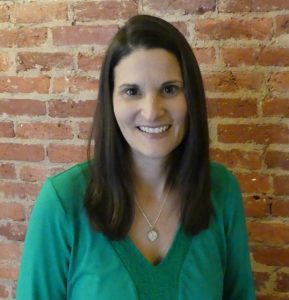 Liz Faircloth co-founded the DeRosa Group in 2005 with her husband, Matt. The DeRosa Group, based in Trenton, NJ, is an owner of commercial and residential property with a mission to “transform lives through real estate.” Liz is the co-founder of The Real Estate InvestHER® community, a platform to empower women to live a financially free and balanced life on their own terms through over 40 Meetups across the US and Canada and an on-line community and membership that offers accountability and mentorship for women to take their business to the next level!
Liz Faircloth co-founded the DeRosa Group in 2005 with her husband, Matt. The DeRosa Group, based in Trenton, NJ, is an owner of commercial and residential property with a mission to “transform lives through real estate.” Liz is the co-founder of The Real Estate InvestHER® community, a platform to empower women to live a financially free and balanced life on their own terms through over 40 Meetups across the US and Canada and an on-line community and membership that offers accountability and mentorship for women to take their business to the next level!
Love the show? Subscribe, rate, review, and share!
______________________________________
To listen to the EXTRA portion of this show go to RealEstateInvestingForWomenExtra.com
To see this program in video:
Search on Roku for Real Estate Investing 4 Women or go to this link: https://blissfulinvestor.com/biroku
On YouTube go to Real Estate Investing for Women
Moneeka Sawyer is often described as one of the most blissful people you will ever meet. She has been investing in Real Estate for over 20 years, so has been through all the different cycles of the market. Still, she has turned $10,000 into over $5,000,000, working only 5-10 hours per MONTH with very little stress.
While building her multi-million dollar business, she has traveled to over 55 countries, dances every single day, supports causes that are important to her, and spends lots of time with her husband of over 20 years.
She is the international best-selling author of the multiple award-winning books “Choose Bliss: The Power and Practice of Joy and Contentment” and “Real Estate Investing for Women: Expert Conversations to Increase Wealth and Happiness the Blissful Way.”
Moneeka has been featured on stages including Carnegie Hall and Nasdaq, radio, podcasts such as Achieve Your Goals with Hal Elrod, and TV stations including ABC, CBS, FOX, and the CW, impacting over 150 million people.
The Gratitude Game – Happy Thanksgiving!

Happy Thanksgiving! There are a lot of things to be grateful for, especially on a podcast about investing and money. Don’t forget to be grateful for the things it can get you. Treat your parents to an expensive dinner or fly someplace with your friends. These can be expensive but just say yes. If your heart says yes, then follow it. Join Moneeka Sawyer as she talks about what she’s grateful for this year and for the future.
—
Watch the episode here
Listen to the podcast here
The Gratitude Game – Happy Thanksgiving!
Happy Thanksgiving. I hope you’re having a wonderful holiday already and spending time with people you love or doing things that you love or both. I wanted to do an EXTRA show because I am feeling a lot of gratitude. I wanted to share that with you and maybe help you to experience a little bit more bliss through this holiday season.
There are a couple of things that I’m feeling a lot of gratitude for. First of all, for this show. I feel a huge amount of gratitude that anybody wants to read, that I’ve got something to say that people find valuable and that you ladies are there for me. You let me know what you need, you’re loving stuff and I’m changing your lives. I feel like I finally found my calling. This is the thing that I’m supposed to be doing. I don’t know why it took me until I was 48 or 49 to figure this out. Why did it take so long?
I’m so grateful that I did figure it out. I am living the dream. It’s fulfilling. I’m changing lives and helping people create bliss, which is my heart work. Also, I’m helping them to create wealth, which will help all of us to live more blissful lives. I want to say thank you to you for being a part of my life and for supporting me. I want to hear from you. Please remember that. Part of what makes my work worth it is hearing from you or hearing what you need.
That doesn’t seem like something a lot of women like to do. We don’t often like to ask questions or for help but I would love it if you do that. I want to hear more. What is it that you need? What questions do you have? How can I serve you more? That makes it more fulfilling and gratifying for me. Thank you for being a part of my life.
It’s not really the money that you want. It’s the ability to say yes to the people you love.
I want to tell you a little bit of a story and I hope this doesn’t come across as a brag. It’s more of making a point. A girlfriend of mine started traveling the country in her RV years ago when she retired. We see each other 2 or 3 times a year. I met her in Belize when I bought my Belize property and in Hawaii. We meet in different places. That’s with our significant others.
She and I have a girls’ retreat for 2, 3 or 4 days every single year. It’s her and me. In 2020, we didn’t get to do either of those things because of COVID. This 2021, when we were doing our weekend away, we decided to splurge. What’s was interesting about this is we haven’t spent money in two years. She texts me and says, “Moneeka, do you want to go to The Ritz?” We usually go to a spa. You know those prices are like they’re not cheap but we’ll spend somewhere between $300 and $500 a night and then we split it.
The Ritz is $1,100 a night. She wanted to do the whole package. What I was so grateful for was that it didn’t even occur to me to say no. I didn’t even think, “That’s so much money.” I didn’t think about any of those things. We’re only going for two nights and we’re splitting the cost. Years ago, I thought I couldn’t do and afford that. My financial situation is better. That’s true. I’m grateful for that. I’m not minimizing that. The thing that I’m most grateful for is that I didn’t have to think about it. How did my life get to that point where I can be a yes when my heart says yes?
There are a lot of people who are richer than me and they can say yes to a lot more things but I’m so grateful for the fact that I wanted to spend this time with my girlfriend, just us girls and connecting. She desperately wanted to do something because she’s never done this before. She doesn’t have anybody else in her life that she could do that. She’s like, “You’re the only person I could even ask and I didn’t expect you to say yes.” I was able to say yes to her. I’m so grateful that I can do that.
The next thing that happened was I went to Mexico with my parents to take care of them. My dad and mom are old. They’re not very mobile but they’ve traveled their entire lives. They don’t want to stop. It’s a quality-of-life issue for them. I want to be able to support them in that. I was able to take time off of work. They were not able to pay for vacation this 2021. Usually, they pay each year but it’s because they have a timeshare. It’s a long story. They weren’t able to get us a condo, so we had to pay. It was not cheap because they’re staying at an all-inclusive resort so that they can travel but not travel or not deal with all the other stuff. We were able to be a yes for that too.
What I’m trying to say is there’s a lot of focus on this show about money and investing. What I want to focus on is gratitude for what those things can get us because it’s not the money that we want. It’s the ability to say yes to the people we love, give to our aging parents, children, spouses, take care of ourselves, be able to be yes to our friends when they need us or want to play in a way that they can’t play normally.

Thanksgiving Gratitude: Be grateful for when you’re buying something expensive and you don’t even have to think why you’re buying it. Get your life to a point where you can just say yes when your heart says yes.
What is it that money gets us? I’m beyond grateful for what it’s able to do for me. In addition, how many donations were able to do this 2021? I did so much more this 2021 than I’ve done in the past. I’ve got that foundation that I don’t worry about this stuff. I can do things in a little bit of a bigger way, be a bigger yes, connect more deeply with my heart because I’m not worried about the budget and donate more when I feel more like I want to do that. I’m so grateful for what my real estate business has provided me in the way of opportunities to follow my heart. I’ve been sitting with that.
Please forgive me if that sounds like a brag. I hope you understand that’s not what the point is here. As I was in Mexico with my parents, I was going to do this there but I decided not to because I didn’t want to get all dressed up. I wanted to focus on my vacation. As I was sitting there on the balcony, looking out at the ocean, I was filled with this incredible feeling of gratitude. That feeling of gratitude is what makes life so worth it.
What’s also cool about feeling that gratitude in that way is I’ve got that to take it with me. When I came back to work, things were on fire. There were technical issues that happened with the show. Some things went wrong. I had to deal with all this stuff. Suddenly, I was hit with stress but because that emotion of gratitude was deep and anchored in me, I could plug into it again and feel that I could bring it back up. I feel grateful for that.
That feeling of gratitude is what makes life so worth it.
I want you to think about this. What is it that we want to create and do in 2022 and beyond? Is it possible to feel gratitude for what we have but also gratitude for what we’re about to create? We can have gratitude for what we have and for what we are about to create. For Thanksgiving, there are a few things that I invite you to do. Maybe it’s not on Thanksgiving Day but if you can do it, as soon as possible. Sit down and be in true gratitude for something in your life. It could be anything, big, small, something that happened now or your whole life. Be able to get deeper into that feeling of gratitude.
When I’m in that feeling of deep gratitude, I touch my heart. In that way, it anchors it. You go into this deep feeling of gratitude. I tell myself this story. I envision what’s going on as much as I can give myself in the way of feeling all the senses, the thoughts, being able to see me in those places, feel, taste, hear or smell that engages that feeling of gratitude. Not just, “I’m so grateful for,” which is great but dropping into your body.
This takes a little bit of time. It’s a little bit more involved than writing, “I’m grateful for this.” Create a story around what that gratitude is and feel it in your heart. When you’re deep in it, maybe touch your heart, fingers together and shoulder, anchor that feeling. Remember to let go of that anchor before that feeling of gratitude tends to disappear because it comes in waves. You feel a huge amount of gratitude, touch and then you start to see it’s fading away. Let go of that anchor because you want that anchor to be the gratitude anchor.

Thanksgiving Gratitude: There’s a lot of focus on this show about money and investing. But what you should really focus on in on the gratitude of what those things can get you.
What I want you to do is think a little bit about what you want to create. 2022 is right around the corner. What is it that you want to create in 2022? You can think of something big or small. I’m not asking you to put together these big goals but there’s a little bit of a gap between where you are and where you want to be. Just because you’re grateful for what we’ve got doesn’t mean we don’t have more. That’s part of what living life is all about. What’s the next step? What’s the next evolution? What’s the next cool thing for us?
You want to think about what it is that. It could be something very small or big, like I want to buy my first piece of property, invest in my first syndication or start a new real estate wholesaling business, whatever it is that you want to do. It could be those things. If it’s those things, you want to pick one step. You don’t want to go for the big gusto thing. You want to pick a step that you can achieve. Maybe, it’s doing research, calling a realtor or whatever that first step is. There’s a gap.
Think about what that goal is or what that future thing that you’re going to create is. Touch your heart and deliver that feeling of gratitude to that new goal as if it’s already happened. You’re going to think of that next step, goal or the other side of that gap, what you’re trying to achieve and then touch your anchor of gratitude. You’re going to feel intense gratitude for this thing already having happened. When you do that, you’re pulling yourself forward towards that next piece that makes part of your life that is going to fill you up and you’re going there with gratitude.
My invitation for Thanksgiving is to fill today and tomorrow with so much gratitude that you can’t help but be blissful. I hope that you loved that and it was helpful. I hope you’re having a wonderful Thanksgiving. I will look forward to talking to you soon. Always remember, goals without action are just dreams. Get out there, take action and create the life your heart deeply desires. I love you, ladies. Happy Thanksgiving.
Love the show? Subscribe, rate, review, and share!
______________________________________
To listen to the EXTRA portion of this show go to RealEstateInvestingForWomenExtra.com
To see this program in video:
Search on Roku for Real Estate Investing 4 Women or go to this link: https://blissfulinvestor.com/biroku
On YouTube go to Real Estate Investing for Women
Moneeka Sawyer is often described as one of the most blissful people you will ever meet. She has been investing in Real Estate for over 20 years, so has been through all the different cycles of the market. Still, she has turned $10,000 into over $5,000,000, working only 5-10 hours per MONTH with very little stress.
While building her multi-million dollar business, she has traveled to over 55 countries, dances every single day, supports causes that are important to her, and spends lots of time with her husband of over 20 years.
She is the international best-selling author of the multiple award-winning books “Choose Bliss: The Power and Practice of Joy and Contentment” and “Real Estate Investing for Women: Expert Conversations to Increase Wealth and Happiness the Blissful Way.”
Moneeka has been featured on stages including Carnegie Hall and Nasdaq, radio, podcasts such as Achieve Your Goals with Hal Elrod, and TV stations including ABC, CBS, FOX, and the CW, impacting over 150 million people.
Syndication Series #4: Senior Living As An Real Estate Investment With Eng Taing
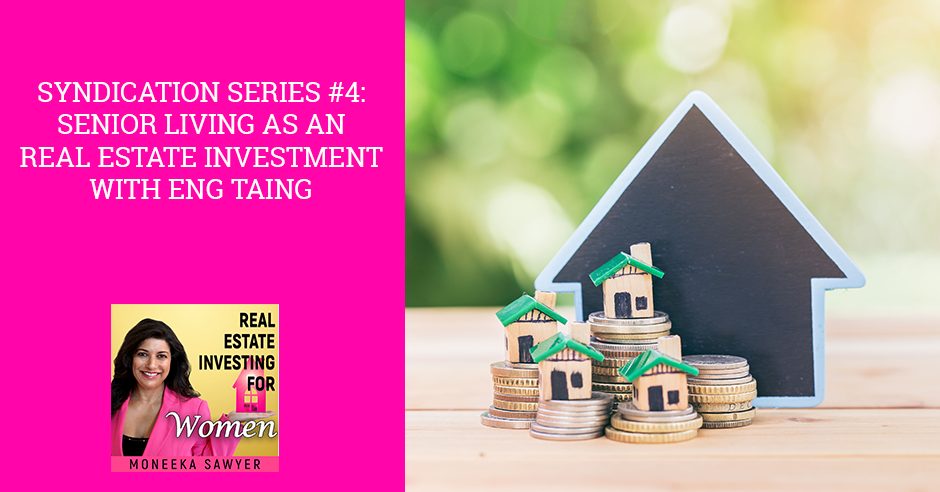
What real estate investments have growth opportunities nowadays? Eng Taing, born in a refugee camp in Thailand, where his family escaped the Khmer Rouge from Cambodia, immigrated to America. Despite not having much, he found a way to thrive for success. Blessed with being good at math, Eng understood data patterns in the real estate market. Now, he is focusing most of his time and money on senior living investments. So how did he end up investing in senior living? Find out by tuning in and learning more about this asset!
—
Watch the episode here
Listen to the podcast here
Syndication Series #4: Senior Living As An Real Estate Investment With Eng Taing
Real Estate Investing For Women
Welcome to the Syndication Series where you are going to learn all about what syndication is, and how you can utilize it to build cashflow and grow your wealth. It’s an exciting strategy and I’m looking forward to sharing all of our guests with you. Let’s get to the show.
—
I am so excited to welcome to the show, Eng Taing. He is the CEO and Founder of Touzi Capital, and a highly experienced real estate investor with $100 million of assets under management. Eng works hard to help people reach their full potential. He is an economist by training from the Wharton School of Business. He also has experience leading data science and analytics at Apple, Capital One and AT&T. He applies that experience when identifying and underwriting investment opportunities in markets. Eng has presented at companies like Apple, Facebook and Amazon, where he teaches employees how to minimize their tax burden and keep and invest more of their earnings so they can achieve financial freedom.
Touzi Capital is a real estate investment company focused on investing in Kansas City that believes that your money should work for you. It has been investing in commercial real estate for many years, and trusts that this is one of the best ways to predictably build wealth through passive income. Touzi Capital focuses on high cashflow investments and providing passive income to investors by acquiring and optimizing multifamily, industrial and senior living assets. In doing this, they want to make real estate investing accessible for the everyday investor through technology and a data-driven platform along with their dedicated team that puts you first. Eng, welcome to the show.
What a mouthful. I don’t even know who wrote that.
Talk to us a little bit about your real estate journey. You went to Wharton Business School and then you moved into real estate. Tell me how that worked out for you.
I would love to take a little step back to my formative years to highlight why I got into real estate and why it’s important for me. I was born in a refugee camp in Thailand. My parents are Cambodians and we escape the Khmer Rouge. There were lots of interesting stories of hiding in jungles and hiding from laws, out of hiding and keeping some pretty terrible stuff. It’s more of my parents’ story. I did grow up in LA and I grew up very poor. I grew up not having much, but I got very lucky to have been growing up in America. I have been fortunate enough to be good at Math and have a family that put a roof over my head, to not see what I didn’t have, and to have enough hunger to drive me to my biggest why.
Hopefully, a lot of your audience has a big why to help them provide security and financial freedom in whatever form that means to their family. That’s been my biggest driver. When I started to get good at Math, I gravitated towards investment banking because that’s the thing people did in my age group. Everybody said, “Let’s go do investment banking. This makes a bunch of money, be a stock trader,” or whatever it is. I did all that. I’m pretty good at Math and at understanding data patterns.
Having a predictable monthly income will make you feel relaxed.
What I found about myself is I did not like the volatility, the up and down, the movement and checking the market. I went through the financial crisis. I helped cause the financial crisis. I’m sorry. When you book $4 billion losses in subprime assets, that’s probably not a great idea. Seeing that side of things and seeing the value of these houses go down, that’s how I first got into my first real estate investments at the young age of 23.
I’m lucky enough to have the capital to deploy at the time. I remember it very clearly. It was a $125,000 investment to a $30,000 purchase price of investment to get $1,000 a month in net monthly income. I liked that feeling of having a monthly predictable income. Obviously, I’m hiding a few things like what I had to do with painting the house, remodeling, getting tenants, and tenant issues. In general, when you come from so little and have just a little bit of security, it gets you a lot of confidence. My story isn’t a story of getting into real estate and just doing real estate. My story is of someone who has always tried to do a lot of things. I had a side passion for real estate and now it’s the main passion of my full-time job or my business.
It’s always been a side hustle. For me and probably some of your audience, you work your 9:00 to 5:00 and you buy real estate. For me, having that passive income help me make better decisions. I was able to go to the Peace Corps when everyone went to MBA. I met my wife in the Peace Corps. I was able to take bolder career decisions of asking for more, of not having a fear-based life of financial insecurity and saying, “I can’t go for this job or make this counteroffer.”
That helped because I was buying real estate every year, and having that little base of support grow and grow. I knew that I didn’t need to have much to survive. Having that, on top of everything else I was doing, gave me more freedom of choice and urgency. It’s a long story of how all these formative things helped me get into real estate, as well as why I’m doing more real estate and why I love preaching to the choir about real estate and subsidiary tax advantage. I’ve heard a lot of people who invest in real estate and not pay taxes. I love talking about that as well.
I went out to lunch with my mother-in-law and I told her, “I’m not sure what’s going on with me but I am getting teary-eyed with everything that’s happening around me.” It’s not everything, but things touched me so deeply. I’m not sure what’s going on with that. Just hearing your story about being a refugee and running to Thailand first, and then escaping to the United States, it’s a very similar story of my parents who had to flee from Pakistan during the separation because they were Hindu. Basically, they only had their clothes on their back and they ran across the border. They had these big houses in Pakistan and India. They had 15 or 18 people living in one dirt-floor shack.
I know the story. I never had to live it. They came to the United States and then had me. When I hear these stories, you realize how insanely lucky we are here in the United States. What I wish is that people understood that luck and it did not deter them from their drive. How old were you when you moved to LA?
Three years old.

Senior Living: The growth of this aging population will need more care, such as better communities and better facilities to take care of them.
You probably don’t remember too much of that struggle. As little people, we still get the subconscious impact of that. Your parents brought you here and they had this drive. They wanted to create safety for you and you got to see that, then that helped you to build that drive. Sometimes, those of us that come from immigrant families have this huge advantage of understanding what it could be like if we were not here and we didn’t have this opportunity. That touched me so much and I wanted to say thank you so much for sharing that story.
You’re welcome. That was my purpose. I love to share my story. My story is my parent’s story. My story is a lot of people’s stories, of not just immigrants who are refugees but of people who don’t have much. I fundamentally believe that it’s a lot of mindsets. It’s having that mindset to be grateful for what you have and what you can have for your health and for all the stuff. I know my son grew up very spoiled. I’m trying to figure it out. I don’t know how to not spoil him. I want him to have fun too. I want to buy him all the toys, but I have pictures of me in his age chasing chickens in the camp. It’s a different journey.
You are right that mindset is everything. You got a mindset from your parents, and you’ve inherited and developed your own mindset. That mindset will then hopefully, will impact your children and the world around you. Everything that we do is done through the filters of our own eyes that are affected by our own minds. If you come from a filter of gratitude, everything that you see will be of gratitude, and living that life helps our children to understand it and see it.
Even with all that they went through, my parents were so grateful to be here. They were so grateful for their children and for their opportunities. That’s a big reason why I’m so grateful for everything too. I totally understand what you’re saying. That mindset piece is huge. I’m sure no matter how spoiled your little one is, he will get that from you too. He might be chasing chickens but he might be doing it in the park.
That’s what rich people in San Francisco didn’t know. They just buy a chicken coop. It’s a sign of affluence that I got chickens and fresh grown eggs.
It’s come full circle. It’s not just an immigrant mindset. I thank you for emphasizing that. There are a lot of people that come from a place where they are not very privileged, or they had very little, or they were in bad circumstances. Through the change of their mindset, drive, and being able to have a vision of what might be possible, they are able to overcome that and create a life of freedom and choice. I released my TEDx Talk, which is called Who Is The Boss Of You? It’s all about economic freedom to give you a choice. We’re on the same wavelength on that. Let’s talk about real estate specifically. Talk to me about your favorite investment class or asset class.
I’ve gravitated towards senior living as a great asset class. For those who don’t know, senior living has many varieties to it. You have nursing homes, independent living, adults 55-plus assisted living. I was fairly in the middle of assisted living where folks, elders, and our residents are the greatest generation and they’ve contributed so much to this country. They are 85-plus. I love to invest in places where you have strong fundamentals or an asset class with strong fundamentals. That means there will be a lot more old people in the future. That’s just the demographic shift that is a known quantity in America, the silver tsunami. The growth of this aging population will need more care, better communities and better facilities to take care of them.
Having just a little bit of security gets you a lot of confidence when you come from so little.
Why I love this asset class, and I’ll compare this to multifamily because I do have both, is it’s both business as well as real estate. It has many great intangible changes. You are renting. You have to have depreciation. You have leverage and all these things that real estate gives you. You also have a business that essentially, for us, is an all-inclusive resort where our rents are typically five times the amount that you would pay for a comparable apartment building. You have a $500 revenue, but you have three times the costs. That comes from making sure that you have three meals a day and all this stuff. It’s just by creating community. I love thinking about creating community and how we can give our seniors the best community as these are the retirement years. These are the years that they would stay probably for their entire lives.
What I like to compare it to multifamily is that typically three years is the average length of stay. Once you get somebody in, they’re staying for a while. Because we do private pay, not Medicaid or Medicare, we know exactly that they can afford these things three-ish years. Overall, they are income resistant. In a pandemic, you can lose your job or income and be unemployed. Our tenants are recession resilient as I would like to call it.
They have an income. They have the money ready. They put that out from the funds. They’re using this for the last remaining years of making sure they’re in a great place. I’ve gotten deep into senior living. The reason why I got into senior living is because I love cashflow. I invest with cashflow and I’ve been investing in California until it didn’t make sense. I’m a nimble and flexible person. I don’t want to just be, “This is what I’m doing. I will only do that. I’m never going to do anything else.”
While you will learn expertise in that thing, if the market shifts, if California gets more expensive, which it has because it gets more regulated and may control, which it has, and if multi-family becomes more expensive, which it has, then I can’t get the same kind of cashflow that I’m used to, and I’m spoiled. I like to surround myself with double-digit cashflow. I’ll invest in this as well. I will chase after good asset classes that there’s a good moat around. When I started, I bought something to invest in, I didn’t have any guidance on how to buy real estate. They didn’t have sites back then. I figured out what to buy and do the math myself. I was pretty good at Math. I can figure it out.
If more people can do what you’re doing, that means the return is not as good. It’s more competitive. What you want to do is get to more uncompetitive areas where you can create a moat of competitive advantage. Senior living has a huge moat. No one is going to go figure it out like, “I want to invest in senior living nowadays.” Hopefully after this show, maybe some of your audience will. It’s definitely a great moat. There are lots of people in the space, but not as many as they should be. There are lots of communities that are thriving even during COVID.
When I think about what I want to continue to do from investing overall is I love cashflow. I say cashflow risk appreciation, even though all my assets have appreciated. This is what happens to assets, especially when the government prints a lot of money. I liked cashflow because I can get that money now and then compound it or invest it in many different things. When you invest for appreciation, you’re like planting a tree, then it becomes a big tree, but then that’s very risky to only have one tree. When you’re investing for cashflow, I like to think of you are planting the tree and you got a forest. You can invest all the cash from it in many different things. Having double-digit cashflow, meaning if you put $100,000, you get $1,000 a month, gives you the freedom to do a lot of different things.

Senior Living: Figure out complicated things. Others won’t do it. So, it’s time to try it out.
That’s what gives you a lot of buffers because if you’re just investing for appreciation, I don’t want to say negative, but others have investments that can do both. That’s the money that you got to put into it every month. If you lose your job, you might not have that cashflow from that property to cover that debt. Cashflow investing for me is always a big buffer of safety. I’m always thinking of how conservative, how safe it can be, and how much money this investment can make so that it pays for itself and for all my other debts.
For senior living, I love the way that you talked about that. I talked a little bit about California as an appreciation market. Usually, you’re going to have negative cashflow, which now everybody is like, “Don’t do that.” It’s a bad word. When you have an appreciation market, you’re usually not going to have any cashflow. Sometimes you’ll break even, or if you hold for a while, maybe. There are different ways of investing in it. It is good to consider what are your goals and to pick a strategy accordingly. I love that you’re so clear on exactly what you want.
Talk to me a little bit about senior living homes. I’ve looked a little bit into it. I’m very curious about it. I’ve got a lot of elderly family members that have been in homes. I hear a lot about insurance issues, not insurance like medical insurance but insurance as in insuring the home. It is its own big thing that none of the other asset classes have. Have you found that to be a particularly big challenge? What do you think about that?
I think of it as an added cost that is baked into the revenue. Your NOI and op expenses are baked into it. It has three times the cost. You had licenses that you have to get. Oftentimes, a medical license but when you open anything you get a license of that nature. We’re building single-story communities where you typically have 80 to 90 people in the community.
We have many different layers of liability protection both from having insurance, which can be costly but it’s baked into the cost, to also a management company, which we either own or a third party. We would have the liability of all the HR because it’s a people business. It’s having people and taking care of people. You want that to live off your investment. You have three entities when you are investing in senior living versus when you have multifamily. You might just invest in your own name. You may have insurance. You could do an LLC but being in California, it’s $18,000 a year.
It is a little bit more complicated but once you get to know that business, you know how to handle those things.
I love complicated things. I love to figure it out and then maybe someone else will do it because it’s complicated. They might want to do it and there will be more for me. That’s great.
Senior living is a queried asset class.
There are two other questions I wanted to ask you. First of all, I do want to talk about opportunity zones and how they fit into this. I know that we’re going to talk more about that in EXTRA. We will get there. The other question is, do you invest in homes and take other people’s money to invest in them? For instance, if I wanted to invest in senior living but didn’t want to have to learn all that stuff, can I do it through you?
That’s exactly what we do. Thanks for bringing that up because I will say all these complicated things. One of the things you could do is at least know that at Touzi Capital, I’m here to provide you with an option to invest with us and participate in the same cashflow that I’ve been talking about and the same stuff without having to sign a loan, without having to get the insurance or having any liability because you’re not even on any of the paperwork and the corp liability business. We take care of everything. All the headaches of hiring people and all that stuff, we’re taking care of. We’re doing this at scale so that when you’re doing anything ten times, you get better at it. It’s something that I appreciate myself. We love to have anyone potentially because you’re investing and growing with us.
Thank you for that. Ladies, as you know, we will be asking him how to get in touch with him. That’s one of those things you might want to talk to him about. If you have an interest in senior living homes instead of learning the whole game, you can have a piece of your investment portfolio with him and make income passively. That’s a possibility too. Talk to me a little bit about opportunity zones. We’re going to do the deep dive in EXTRA about this, but give us a little high level because I know that several of your properties are in opportunity zones. Is that true?
Yeah. We’re developing two properties. One is Jacksonville. We’re breaking ground. I will be flying over for the ribbon-cutting ceremony. I love opportunity zones and what it represents, which is a new law that was passed during the Trump Tax Cuts. If you know the letter of the law or the tax code, you can reduce your taxable income, which means you can keep more of your earnings. If you work hard for your money, keep more of your money. Use all the things that the rich people and investor class use all day. This is a great opportunity because we have a lot of folks who have a lot of stocks. I come from Apple and they make a lot of money from stocks.
When you sell stocks, you have to pay capital gains. In fact, when you sell almost any asset, you have to pay capital gains. That capital gain is tax and for opportunity zones, it’s the first class of investment that you can essentially say, “I’m not going to pay that. Not now. I’ll pay that later.” Put that money into an opportunity zone. If you owed $100,000 of taxes on capital gains, don’t pay that. Pay that later. We defer taxes all the time. That’s a great strategy. That’s all real estate. That’s what people are most interested in. When you do 401(k), you want to defer taxes in the future. You defer taxes for six years, not too long, then you reduce it by 10%, and then you hold it for ten years. It’s quite a while for any real estate investment. All future capital gains get eliminated.
Compared to a non-opportunity investment, and I do have both, if given the same number of returns, let’s say, 12% each annual return, the opportunity zone will give you 50% more money at the end because you would have free money going in and free money going out. It’s like a Roth and 401(k). I can go into the details on that too but basically, don’t pay taxes if you can. There are ways to do that. Even if you’re a W-2 employee and working hard, there are many ways. If you’re investing in money, investing in opportunity zones, investing in places that the government is saying, “Invest in this place. You would get a great tax benefit.” These places sometimes are great places to build senior living communities.
You totally piqued my interest. I would like to do a deep dive on that in EXTRA, where you can talk a little bit more about how that actually works because you go to high-level as I asked. I want to know more about that and exactly how that works. Ladies, we’ll be talking about that in EXTRA. Definitely stay tuned for that. Before we go to our three rapid-fire questions, tell everybody how they can reach you.

Senior Living: Just get started. You will fail. You will learn. It’s all the same. It’s going to be a great journey.
They can reach me at our website TouziCapital.com and email me at [email protected]. I am always happy to talk about taxes, real estate investing, and financial freedom. It’s all the things I’m passionate about. I have YouTube videos and TikTok. I got viral and it’s a million views. What we love about this space compared to everything else I’ve been doing is I’ve done a lot of talking to people and seeing people on their journeys. I’ve learned so much by talking to people. If you’re trying to do anything, networking and relationship building is key to success.
Definitely, get in touch with him. He’s very generously offering some of his time, which not very many people do. Be respectful and kind. If you’re interested in this topic, give him a call or send an email. Eng, are you ready for our three rapid-fire questions?
Yes.
Give us one super tip on getting started investing in real estate.
I hate saying it depends, but what I always say is get started. Just do it. A lot of people always think. I think too much. I think all the time. Getting started is going to be the best way to learn. If you’re short of money, find somebody who has money. If you are short of time, find somebody who has time. Those two things, time and money, will allow you to get into real state. There are so many technologies nowadays. You can use Redfin, Zillow or all these great applications that I didn’t have when I started. That will help you to get into it. Just get started. You will fail. You will learn. It’s all the same, and it’s going to be a great journey.
Tell us one strategy for being successful in real estate.
The big strategy that I’ve come to is to value your time. If you value your time, then you can create processes or decisions that are going to keep you down in the weeds or quagmire of figuring out how to evict somebody or do this or that. While you have to do that in the beginning, if you’re trying to be successful, that means you will try and do this a lot. You’re not just going to try this once. If you get lucky, you’ll try this ten times. Think about what you would want to do 5 to 10 times over and figure out how to scale. That’s why for me, it’s always been about going up, scaling, and knowing that a multimillion-dollar loan is easier than a $100,000 loan. I just need the income for it. I just need to have the experience. Scaling and thinking about how to do things multiple times is always a great strategy to be successful.
You work hard for your money. Keep more money.
Scaling and systems conserve your time. What is one daily practice that contributes to your personal success?
I do fasting. I’m an intimate faster. That’s a little bit of me back in time and not eating breakfast. I used to eat a lot when I was working at a corporate job. I loved having lunches but what I found is there are some great health benefits of fasting for me, not for everybody. For me, it’s giving me a little focus during the day to have a black cup of coffee, and then get into my routine. That has helped me focus on the task at hand every day.
This has been fabulous so far. Thank you so much for joining us for this portion of the show.
Thanks for having me.
Ladies, we got more. We’re going to be talking about opportunity zones and how they can save you in taxes, capital gains and all that cool stuff. I’m super excited about that. Stay tuned for EXTRA if you are subscribed. If you are not but would like to be, go to RealEstateInvestingForWomenExtra.com. You get the first seven days for free. You can download this one and whatever ones you want to read and check it out. For those of you that are leaving us now, thank you for joining Eng and me for this portion of the show. I look forward to seeing you next time. Until then, remember goals without action are just dreams. Get out there, take action, and create the life your heart deeply desires. I’ll see you soon. Bye.
Important Links
- Touzi Capital
- Who Is The Boss Of You? – TED Talk
- [email protected]
- YouTube – Touzi Capital
- RealEstateInvestingForWomenExtra.com
About Eng Taing
 Eng is an experienced private fund manager with $100M assets under management. He has 12 years of private market and real estate investing experience and has focused on cash flow investing to create significant passive income. Eng is an economist by training, from the Wharton School of Business. He also has experience leading data science and analytics at Apple, Capital One and AT&T. He applies that experience when identifying and underwriting investment opportunities and markets.
Eng is an experienced private fund manager with $100M assets under management. He has 12 years of private market and real estate investing experience and has focused on cash flow investing to create significant passive income. Eng is an economist by training, from the Wharton School of Business. He also has experience leading data science and analytics at Apple, Capital One and AT&T. He applies that experience when identifying and underwriting investment opportunities and markets.
Eng is the classic immigrant story that can only happen in America. He was born in refugee camp in Thailand, where his family escaped the Khmer Rogue from Cambodia. Having grown up in Los Angeles, he pursued economics by day trading and playing Poker to pay for his tuition while attending the University of Pennsylvania. There he trained as an economist and afterwards went into Investment banking. Later he would leave the financial world to join the Peace Corps, volunteering in the Republic of Georgia–a year after the Russian invasion. There he met his wife–Jennie, who was also volunteering abroad. They now have one son, with another on the way.
Eng has presented at companies like Apple, Facebook, & Amazon where he teaches employees how to minimize their tax burden and keep and investing more of their earnings so that they can achieve financial freedom.
Love the show? Subscribe, rate, review, and share!
______________________________________
To listen to the EXTRA portion of this show go to RealEstateInvestingForWomenExtra.com
To see this program in video:
Search on Roku for Real Estate Investing 4 Women or go to this link: https://blissfulinvestor.com/biroku
On YouTube go to Real Estate Investing for Women
Moneeka Sawyer is often described as one of the most blissful people you will ever meet. She has been investing in Real Estate for over 20 years, so has been through all the different cycles of the market. Still, she has turned $10,000 into over $5,000,000, working only 5-10 hours per MONTH with very little stress.
While building her multi-million dollar business, she has traveled to over 55 countries, dances every single day, supports causes that are important to her, and spends lots of time with her husband of over 20 years.
She is the international best-selling author of the multiple award-winning books “Choose Bliss: The Power and Practice of Joy and Contentment” and “Real Estate Investing for Women: Expert Conversations to Increase Wealth and Happiness the Blissful Way.”
Moneeka has been featured on stages including Carnegie Hall and Nasdaq, radio, podcasts such as Achieve Your Goals with Hal Elrod, and TV stations including ABC, CBS, FOX, and the CW, impacting over 150 million people.
Syndication Series #3: Fundamentals Of Investing To Achieve Financial Independence With Chris Larsen
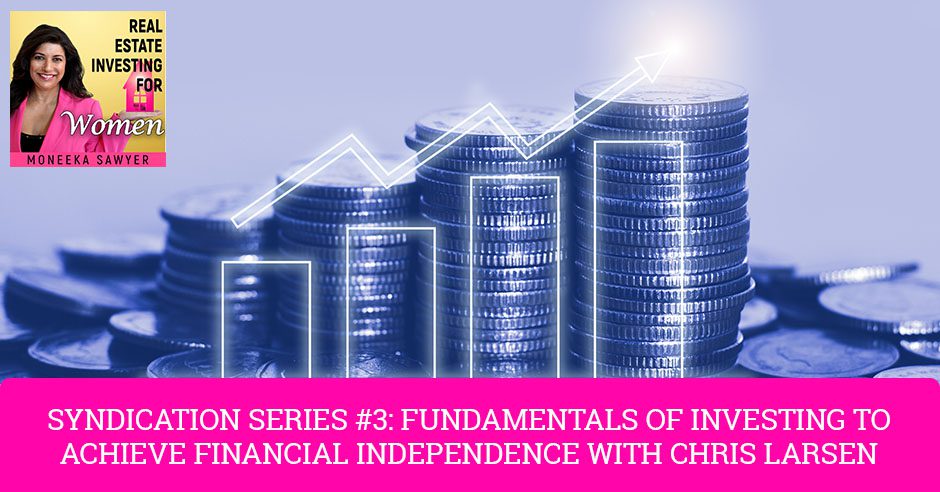
Real estate is the best path towards achieving financial independence. Becoming financially independent means having the choice to do what you want with your time. In this episode, Moneeka Sawyer sits down for some great insights into real estate with investor, author and entrepreneur, Chris Larsen of Next Level Income. We hear Chris narrate what got him into real estate, starting from single family to commercial real estate. Chris also shares his investing strategy and how Infinite Banking works, and how to leverage your insurance policy for cashflow. Drop by and listen in as Chris and Moneeka share valuable information for investors to use.
—
Watch the episode here
Listen to the podcast here
Syndication Series #3: Fundamentals Of Investing To Achieve Financial Independence With Chris Larsen
Real Estate Investing For Women
In this episode, I am so excited to welcome to the show, Chris Larsen. He is the Founder and Managing Partner of Next-Level Income. Chris has been investing and managing real estate for several years. While still a college student, he bought his first rental property at the age of 21. I love people that get into this industry young.
From there, he expanded into development, private lending, buying distressed debt, as well as commercial offices and ultimately syndicating multifamily properties. He began syndicating deals in 2016 and has been actively involved in over $225 million of real estate acquisitions. He is passionate about helping investors become financially independent. Chris, welcome to the show.
Thank you so much for having me. I’m excited to be here.
I’ve been looking forward to this show and you’ve been so patient with me with all the rescheduling. Thank you. I’m glad we’re finally here. Chris, give us a high level of your story. I know it’s very exciting.
First off, I love that you bring up to get started early. Now it’s early, whenever you can do it. I was 21 when I was in college. My passion at the time was racing bicycles. I went to Virginia Tech for Biomechanical Engineering. I did pretty well in school and I was told like, “You should be an engineer like your grandfather.” All I want to do is race bicycles.
Cycling is like a real engineer sport because it’s all about numbers and power to weight ratios. At that time, drug which I wasn’t into. That was the end of my story in a lot of ways because I didn’t want to do that. Along the way, at that same time, when I was at this turning point, trying to decide what to do as I was looking towards a professional career, my best friend, roommate and training partner passed away. He had a massive brain hemorrhage between my freshmen and sophomore year in college.
I poured another year into the sport and then I realized even after I was winning more and more races, that I wasn’t happy. Even though my team went professional, I didn’t. I stepped away from the sport, went back to school. As a junior in college, I thought like, “What the heck am I going to do with my life? I don’t want to be an engineer. I was going to go race and then figure out what I wanted to do.” While I was racing and even when I was young, the first thing I remember and probably if you’re reading, you think the same thing. You hop on your bike and you have this tremendous sense of freedom. That’s what I wanted.
I wanted the freedom to live life on my own terms to respect not only the life I was giving them but also the life of the friend that I lost. I turned towards investing. I was introduced to it by the same gentleman, Clint Provenza, who introduced me to cycling. My father passed away at five and he was a real mentor to me. I started looking into investing. I was day trading, and one of those nights/mornings that 3:00 AM, when I was laying there in bed, thinking about what I should do with my trades. I thought like, “Do I want to be doing this twenty years from now?” The answer was no.
I looked at other investments. I read over 250 books on money, investing and settled on real estate because you could control it. I bought my first property at 21. I built and managed a portfolio of single-family rentals for fifteen years but ultimately transitioned into commercial real estate. That’s what we focus on. I try to enlighten people and share my mistakes, so they can take the fast track to get towards financial independence, which took me a couple of years.
It’s so interesting. I have a very similar story in that. I wanted to be a dancer and that was my thing. I came to investing for a similar reason. I wanted a life of choice. I think that freedom of choice is our true wealth. That’s what I wanted and real estate allowed that. It did take me several years before I could say I could retire, my husband and I, but I couldn’t do with the lifestyle that I wanted in California. We would have had to move, so we continued to grow our portfolio, but it was the same thing. After several years, we are doing everything now that we’re doing because of the choice and we want to do that. There’s nothing more liberating than that.
At some point, income is important, but it’s the freedom to choose that brings happiness.
I think studies show. I teach a financial literacy course here. It’s high school students coming out of underprivileged homes. Most of them are living below the poverty line. We had a conversation about, at some point, income is important, but it’s the freedom to choose. I cited the study that shows the janitors that have freedom in their day-to-day choices are happier than the CEOs that are making 10,000 times now what they are, but they’re not happy because they don’t have freedom.
My TED Talk is about this and there’s a lot of research about there’s a threshold where money does buy happiness to a certain threshold. The original number they came up with within 2010 was $75,000, but a study was done in January 2021 that said it was $100,000. It’s gone up because of inflation. Whatever that number is, it’s $100,000 now.
Up until then, the number of dollars that you bring into your household does relate directly to the level of happiness in the household or the level of satisfaction. After that, now we have freedom and excess income. We are taken care of and now we can focus on joy, bliss. I’m so glad we’re on the same wavelength around that. Tell me about this concept of infinite banking.
Next-Level Income was born of this desire to curate information around financial literacy and education. As I built it out, we have three main areas. We talk about how to make, keep and grow your money. Those are the three steps. I have coaching clients and that’s what we work through like, “How can you maximize how much money you’re making? How can you keep more money?”

Financial Independence: Freedom of choice is our true wealth. Real estate allows that.
Thank you so much. Talk to me about your perspective on multifamily. This is a hot topic with my ladies.
I call multifamily real estate the holy grail of investing. If you look at my book, it says How to Make, Keep, and Grow Your Money Using the ‘Holy Grail of Real Estate’ to Achieve Financial Independence. I’ll send you a copy for free if you go to the website. I’m so high on multifamily. I was the person that managed my portfolio for fifteen years.
I was the person that got the phone call on my honeymoon in Costa Rica and paid $40 and collect call fees to deal with a problem tenant. I was the guy that stayed in too long and didn’t get a great return on my properties. I was also the guy that was fortunate enough to run into somebody that introduced me to this space. I started to investigate multifamily real estate and I’m a demographics guy. I spent eighteen years in the medical device industry. That’s how I made the money to invest. I got into a medical device.
I moved and lived in Asheville, North Carolina, because we have great demographic trends. When I started to investigate multifamily being an engineer, day-to-day guy and analytical, I found that multifamily was supported by these terrific demographics by what we now call the Millennials. They rented and guess who’s supporting multifamily now? It’s their parents, the Baby Boomers. They’re selling their homes and renting and now Gen Z is renting as well. We’ve turned into this nation that we like to own the American dream, but also flexibility.
I jumped into multifamily because of the demographics and the analytics. My MBA is in Portfolio Managementhat I found is something that Ray Dalio calls The Holy Grail of Investing, which allows you to increase the Sharpe ratio. The Sharpe ratio increases the returns of your portfolio and decreases the risk. It’s like a boat that goes faster and it has less bumps when you’re on it. I thought, “What is better than that?” Ray Dalio calls that The Holy Grail of Investing. I call multifamily the Holy Grail of Real Estate because it allows you to increase the returns in your portfolio and allows you to decrease the risk.
I know that in EXTRA, we’re going to talk a lot more about multifamily. We’re going to go deeper to the pros and cons of multifamily and then he’s going to do some number breakdowns for us. These are things that I get asked about a lot. It’s not my strong suit. My husband and I have not been involved yet in multifamily. The commercial evaluation of the numbers is not his strong suit, so he hasn’t had to do it yet. This will be fun. EXTRA will be talking a lot about that stuff, but why don’t you give us a high level on why you like multifamily? What’s so exciting about it?
There are a few things. If you’re reading and you’re like, “I love real estate, but I don’t want to be the person that has to go in and fix toilets, find new tenants, screen people and do showings and all that.” I get that because I’ve done it. The big thing is if you invest in multifamily with an experienced operator, it’s 100% passive. You can invest, be a direct owner, get the income, the depreciation and the depreciation of great tax benefits, especially if you’re a high-income earner, but you don’t have to deal with it all yourself. That’s fantastic. It’s scalable.
You could buy a 100 unit multifamily building for $10 million. You could buy a $1 billion multifamily portfolio. Whether you’re investing in your first deal or you’ve been investing for twenty years and you’re looking to place $1 million or $10 million of capital, you can use the same strategy. It’s very scalable. There’s something that I like even more, it’s the control. You might’ve heard me talk about laying in bed at 3:00 AM feeling like things were out of control with my money. I like real estate because you can control it.
We’re acquiring a property in Greenville, South Carolina and we live in Asheville, which is about an hour away. We were down in South Carolina for my son’s 9/11 lacrosse game. I took him to the property and we drove around. It was built in 1997. It’s a little beat up. The stairs needed to be replaced. They need new paint. We can control all of those things. If you own a business, apartments are valued like a business. They’re valued by net operating income. If you live in your home or you have a rental home and it’s 1,000 square feet, and it sells for $300 a square foot, it’s worth $300,000. It’s easy math.

Financial Independence: Next Level Income was born of this desire to curate information around financial literacy and education.
The bank figures that out because they say, “The home on your right is worth $305 a square foot, on your left is worth $295 a square foot.” Yours is about $300 a square foot. You don’t control that. The market goes up and down. If we go and buy an apartment building for $10 million and it has $1 million of net operating income, that’s probably not a great metric. Call it a $20 million apartment building with $1 million in net operating income.
We increase the net operating income 50% from $1 million with a $20 million to $1.5 million new valuation. You’re probably thinking to yourself when your cap rate is $30 million. We control that when we’re able to move the rents by the renovations, operations, being more efficient, bringing better management and those sorts of things. Again, it’s passive and scalable, but most importantly, it’s controllable.
I’m sure some of you are like me going, “Wow,” but we will break this down so you can go through this again and we’ll break down more of that in EXTRA so we can take it a little bit slower. I feel like you already covered this. What are the important metrics? What exactly should we be looking at?
I’ll dive a little deeper again. We can unpack this a lot more in the EXTRA section. I started as an investor in these deals. I was called a limited partner before I syndicated these deals and became a general partner. If you’re a limited partner and you say, “I’m interested in this.” You need to look at three different things. You need to look at geography. Are you investing in an area of the country that people want to move to? I wrote a whole blog post about this. I talked about how you can identify these. It’s very easy to see with reports from companies like United Van Lines. You can go on our blog at the beginning of 2021 and read the post I put on there.
You want to be in large cities where people are moving, that is growing faster than the national average. Where are these cities? A lot of these are from the Southeast. I moved to North Carolina for the demographics, the Carolinas, Florida, Georgia, Texas, Phoenix, Colorado and Boise, Idaho seems to be a big one here. Why are people moving here? They’re moving out of California to places like Colorado, Texas and Idaho.
They’re moving to the Southeast from places like California, LA, New England and New York. The places that are cold and don’t have a great quality of life. Taxes are going up. I have a coaching client. He told me and he’s like, “We’re looking at South Carolina to move. Taxes are going up. We don’t want to live here anymore.” Number two, the operator. Are you working with an operator? This is somebody that’s going, finding and buying the property. That’s going to bring you in alongside them and then they’re going to operate it. They’re going to increase that net operating income.
Have they done it before? Have you done it in the geography that you’re invested in? What is their experience there? You want to ask him some tough questions about what’s their strategy. You look at the metrics in the deal. That’s pretty complex. We looked at over two dozen different metrics on the deals that we’re in, and there are a lot of different variables that come into play. Again, if you’ve ever invested in a business, if you’re a business owner or professional, you can read a financial statement.
That’s the thing. If you call me and say, “I’m interested in this deal.” As an owner of this property, you’re entitled to all the same information that you would be entitled to if you own a single-family home. You can go through those and you can call the operator and say, “Walk me through this. What am I seeing here and there?” Don’t be afraid to ask those questions and understand the numbers, strategy and why an operator is going into the market.
Talk to me a little bit about ROI. Different operators do this differently. Tell us a little bit about how you structure your deals for your investors.
What we do is called syndication. Syndication is very simple, it is someone, an operator going out and bringing in investors alongside them to invest. What’s important is how that syndication is structured. What we do is we do what’s called a preferred return. If you look at deals, say 6% to 8%, what does that mean? That means investors get the first 6%to 8% of the returns coming from that property. Investors are preferred in front of anybody else. They’re going to be subordinate to the lender.
The other thing that’s nice about these properties is it’s called non-recourse debt. I work with a lot of doctors after spending several years in the medical device profession. They don’t want more risk, more debt and a bank to come after them for something. They have patients that are out for them if something bad happens. That’s a nice thing about these properties as well.
After taxes, the next biggest expense that a lot of people don’t think about is financing.
After the lender, the investors get that preferred return. There’s an equity split. That split is a large part that goes to investors and then the partners that organize these deals get the minority position in there, but that’s the incentive. You want to work with the group, in my opinion. How we do it is we give the investors the first big portion of the returns, about a half of the returns upfront. The other half comes from that split on the backside and then we as partners get a piece of that split.
We’re incentivized to maximize the profit of that property on the backend. You asked a question there and I’ll address this. There are a couple of different ways to look at this. You can look at a total return. You’re going to get a 10% return comprised of half cash and half appreciation on a property. There’s also an equity multiple. You’re going to double your money over a certain period of time, it’s another way to look at it. There’s also what’s called the IRR, the Internal Rate of Return.
We can dive deeper into the EXTRA portion of the show or you can go ahead and check out my book, which goes deeper into this as well. You can always read on a site like Investopedia, which dives deeper too. It depends on what type of investor you are. Maybe cash or the total return is important to you. It all depends on what type of investor you are.
Do you pay investors immediately? When they first invest money, are they guaranteed a certain return each year while the project is happening? How do you structure that for your people?
One little red flag is we never say guaranteed because these are investments that have a risk associated with them. If you ever hear me say guaranteed, you should either slap me on the face with a stick and a paper towel or something in my mouth too. We have a couple of different types of investments. We have investments that we pay investors a fixed return based upon the performance of the property. Our group pays out monthly. We like to pay out monthly. There are groups that payout quarterly. It’s not necessarily better or worse, but personally, I like to get money in my account every month.
You then get some stuff on the backend depending on how the project goes.
In multifamily syndication, you’re going to get regular cashflow monthly, quarterly or annually. When the property sells, think about it like a rental property. You’re getting rent. If you’re renting it out for $1,000 a month and your expenses are $900, you might get $100 a month. When you sell it, if you bought a property for $100,000 and you sell it for $150,000, you get that $50,000 profit on the backend. It’s very similar to that.
Do you guys do the whole refinance structure piece too or do you go for the sale?
When we model out the returns on a property which is called the pro forma, we don’t assume we’re going to refinance the property. If you’ve ever owned a rental property or you have a property of your own, what’s nice is if you have a HELOC, a Home Equity Line Of Credit and you pull money out of your home or an investment property, you don’t pay taxes on that when you pull that money out.
You might pay taxes when you sell it, but you don’t pay taxes when you pull it out. It’s very similar to what we do. A lot of times, we look to do that if the property is performing. We don’t tell investors that’s part of the plan because we want to be a little bit more conservative than that but that is a very optimal way to pull an investor capital out in a tax-efficient manner.
While we dove pretty deep into all of that stuff and I know we’re going to get even deeper, so definitely stay tuned for EXTRA. We’ll be talking more about the fundamentals of multifamily investing and the numbers around that and also the why or why not to do it.
Before we move into our three rapid fire questions, I want to let you ladies know how you can get in touch with Chris because he’s amazing, isn’t he? He’s got two awesome offers for you today. First of all, he’s going to give you his book for free and he and I are holding a webinar together so that you can meet him live and ask as many questions as you’d like.
Learn how you can invest like the rich to create true freedom for yourself by getting a free copy of his book nextlevelincome.com/bliss, where he’ll send you a copy of his book for free.
Also join Chris and me for a free webinar designed just for you to get informed and ask questions about how Chris does syndication and how he can help you to save the date. December 2nd, at 4:00 PM Pacific time. Go to blissfulinvestor.com/syndicationwebinar. That’s blissfulinvestor.com/syndicationwebinar.

Financial Independence: Syndication is very simple. It’s an operator going out and bringing in investors alongside them to invest.
I didn’t tell you this, Chris, but we have three rapid-fire questions. Are you ready?
I love it. I’m ready. I told you I’m wide open here, so let’s do it.
Tell us one super tip on getting started investing in real estate.
The best tip I can think of is to find somebody that has gone down the path you want to go down and either ask them for advice or hire them to help be a mentor.
What would you say is a strategy to be successful in real estate investing?
I think success, in general, is habits. Whether you want to be successful in real estate, successful in life, losing weight or whatever it may be, you need to focus on your daily habits. If you want to be successful in real estate, that may be in as far as syndications or passive investments or reviewing a deal every day or every week. If you are going out and buying your own properties, that may be contacting brokers, making phone calls and getting options out there that are coming in towards you on a regular basis.
What would you say is one daily practice that you do that contributes to your personal success?
I’ve learned a lot over the past years. I bought my older son The Five Minute Journal for Kids. It is basically a gratitude practice. I know you’re big on this. I think happiness comes before success. You have to get in that right mindset, the abundance mindset, which is what you share. You know that success and that money will come to you and there’s always a deal out there. You don’t have to worry and fight over these things. Share, help other people and other people will help you get in the right mindset. That’s what I try to do every day.
This has been an amazing show. Thank you so much for all you’ve already contributed, Chris. This has been great.
It’s my pleasure. Thank you so much for having me.
Before we close out the show, I want to head off any confusion we might have about upcoming webinars. So in order to make this series the most valuable possible for you, I have arranged to have two webinars during the next couple of weeks.
The first one is going to be with Dr. Sam, who you heard from a couple of weeks ago. He is an investor just like you ladies. And he has figured out how to evaluate syndication opportunities that come across because he gets a lot of them. And if you’re interested in them and you put your name out there, you will start to get a lot of them. You’ll learn how he evaluates them so he can figure out which projects are the best for him regarding his risk tolerance, his capital availability, and what kinds of projects he’s actually interested in, like location and that sort of thing.
Dr. Sam has developed a tool he’s now sharing. So we’re going to do a webinar with him and you can talk to him about what it’s like to be an investor in syndications and what to expect. And then also he’s going to go through his tool specifically and show you how he’s evaluating different projects. So I’m really excited about this because you actually get to have a conversation LIVE with another investor who’s actually doing investing in syndication projects. So in order to sign up for that webinar, go to blissfulinvestor.com/Samwebinar. So that’s for Dr. Sam, right? So blissfulinvestor.com/Samwebinar. And that webinar is going to be held this week on Thursday, November 18th at 5:00 PM Pacific time. So again, that’s Thursday, November 18 at 5pm pacific time. Go to blissfulinvestor.com/Samwebinar.
The second webinar we’re doing for the syndication series is with Chris, who we just heard from in this episode. As you know, he’s an operator. So he’s going to be able to answer questions about how syndications actually work, how they’re put together and all the details of what you can expect from an operator. So that’s really exciting because you can ask as many questions as you want from an actual operator LIVE. So that’ll give you more confidence what you need to know with regards to how syndications are run. So I’m super excited about this one too. And this one is on Thursday, December 2nd, at 4:00 PM Pacific time. So that’s Thursday, December 2nd at 4:00 PM Pacific time. And to sign up for this one, go to blissfulinvestor.com/syndicationwebinar. So that’s blissfulinvestor.com/syndicationwebinar.
So to give you a really quick recap, Dr. Sam, who is an investor and is going to be sharing his evaluation tool, we’ll be holding a webinar this week on Thursday, November 18th at 5:00 PM Pacific time . Go to blissfulinvestor.com/Samwebinar.
And then Chris Larson will be holding a webinar as an operator on Thursday, December 2nd, at 4:00 PM Pacific time, just go to blissfulinvestor.com/syndicationwebinar.
I think you’re going to love both webinars because you’ll get two completely different perspectives. So don’t miss them sign up now.
Stay tuned for EXTRA. We’re going to be talking more about the fundamentals of multifamily. If you are not subscribed but would like to be, please go to RealEstateInvestingForWomenEXTRA.com. You get the first seven days for free. Check it out, download as much as you can and you can stay if it’s for you. Thank you so much for joining us for this portion of the show. We appreciate you. I look forward to seeing you and until then remember, goals without action are just dreams. Get out there, take action and create the life your heart deeply desires.
Important Links
- blissfulinvestor.com/Samwebinar
- blissfulinvestor.com/syndicationwebinar
- Becoming Your Own Banker
- Next-Level Income
- TED Talk – Who is the Boss of You?
- Ray Dalio
- Where Should You Move? 5 Ways To Take Advantage Of “Geographic Arbitrage.”
- United Van Lines
- The Five Minute Journal for Kids
- RealEstateInvestingForWomenEXTRA.com
About Chris Larsen
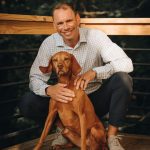 Christopher Larsen is the founder and Managing Partner of Next-Level Income. Since “retiring” after 18 years in the medical device industry he dedicates his time to helping others become financially independent through education and investment opportunities. Chris has been investing in and managing real estate for over 20 years. While completing his degree in Biomechanical Engineering and M.B.A. in Finance at Virginia Tech, he bought his first single-family rental at age 21. Chris expanded into development, private-lending, buying distressed debt as well as commercial office, and ultimately syndicating multifamily properties. He began syndicating deals in 2016 and has been actively involved in over $400M of real estate acquisitions. In addition to real estate, Chris has invested in equities, oil & gas, and small business lending, as well as being active in Venture South, one of the nation’s Top 10 Angel Investing groups. Chris lives with his wife and two boys (and Viszla, Lucy!) in Asheville, NC where he loves spending time with them in the outdoors and enjoying the food and culture that the region has to offer.
Christopher Larsen is the founder and Managing Partner of Next-Level Income. Since “retiring” after 18 years in the medical device industry he dedicates his time to helping others become financially independent through education and investment opportunities. Chris has been investing in and managing real estate for over 20 years. While completing his degree in Biomechanical Engineering and M.B.A. in Finance at Virginia Tech, he bought his first single-family rental at age 21. Chris expanded into development, private-lending, buying distressed debt as well as commercial office, and ultimately syndicating multifamily properties. He began syndicating deals in 2016 and has been actively involved in over $400M of real estate acquisitions. In addition to real estate, Chris has invested in equities, oil & gas, and small business lending, as well as being active in Venture South, one of the nation’s Top 10 Angel Investing groups. Chris lives with his wife and two boys (and Viszla, Lucy!) in Asheville, NC where he loves spending time with them in the outdoors and enjoying the food and culture that the region has to offer.
Love the show? Subscribe, rate, review, and share!
______________________________________
To listen to the EXTRA portion of this show go to RealEstateInvestingForWomenExtra.com
To see this program in video:
Search on Roku for Real Estate Investing 4 Women or go to this link: https://blissfulinvestor.com/biroku
On YouTube go to Real Estate Investing for Women
Moneeka Sawyer is often described as one of the most blissful people you will ever meet. She has been investing in Real Estate for over 20 years, so has been through all the different cycles of the market. Still, she has turned $10,000 into over $5,000,000, working only 5-10 hours per MONTH with very little stress.
While building her multi-million dollar business, she has traveled to over 55 countries, dances every single day, supports causes that are important to her, and spends lots of time with her husband of over 20 years.
She is the international best-selling author of the multiple award-winning books “Choose Bliss: The Power and Practice of Joy and Contentment” and “Real Estate Investing for Women: Expert Conversations to Increase Wealth and Happiness the Blissful Way.”
Moneeka has been featured on stages including Carnegie Hall and Nasdaq, radio, podcasts such as Achieve Your Goals with Hal Elrod, and TV stations including ABC, CBS, FOX, and the CW, impacting over 150 million people.

